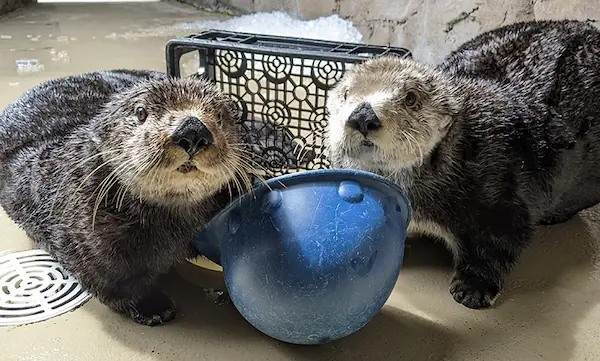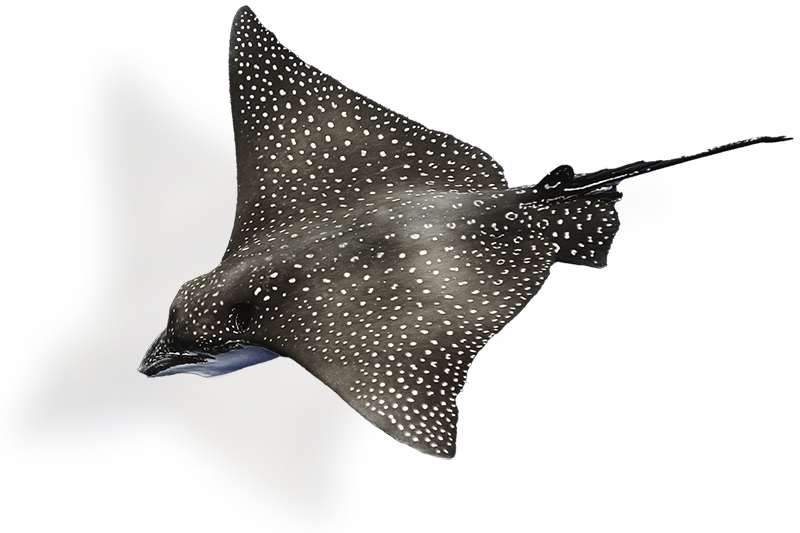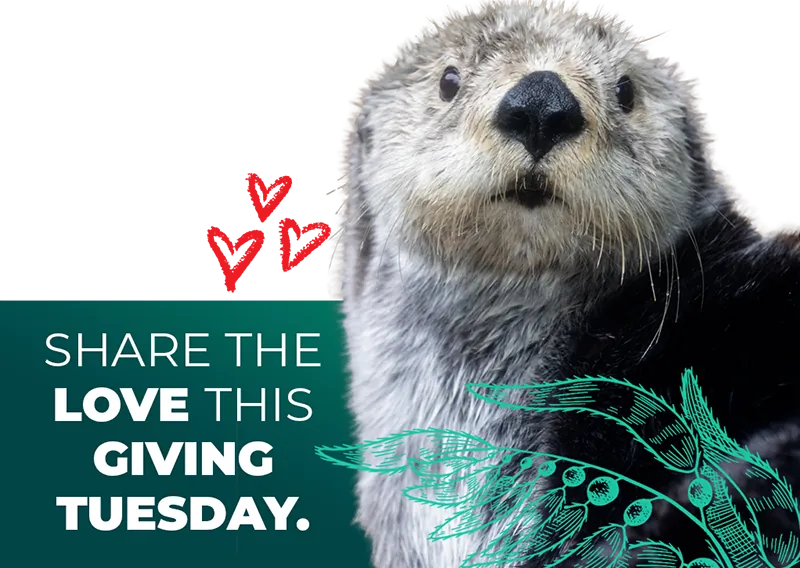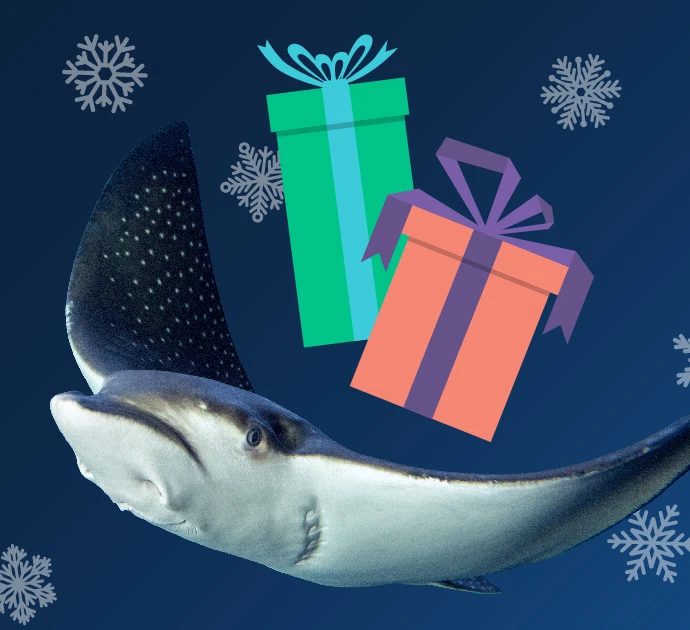How to use this guide
The following guides were created to help make school field trips to the beach more accessible. Studies show that spending time in nature leads to better outcomes in cognitive development, stress management and environmental stewardship. By taking your students to the beach, you can help create a new generation of humans who are inspired by the nature around them and empathetic toward the animals that live in their neighborhoods.
The Seattle Aquarium identified 12 local beaches in both north and south Seattle that are easier for students to navigate. Each of these beaches is marked on the map below. The Aquarium has created a profile for each of these beaches to help teachers identify whether it is a good location for a field trip. You’ll find information about parking, bathrooms, reservable shelters and animals to keep an eye out for. You’ll also learn what tide level data is transmitted at each specific site from the National Oceanic and Atmospheric Administration (NOAA) buoys.
All age groups benefit from time outside. The Aquarium is currently developing lesson plans for all school age groups that teachers can reference during the field trip. Check back soon for updates!
Carkeek Park
- Address
1400 NW Carkeek Park Road, Seattle, WA 98177
- Land acknowledgement
Suquamish, Duwamish
- About the beach
This beach is great for all age groups (especially younger) because the walk to the water is short. However, to get down to the beach from the parking lot you must cross a bridge that goes over the top of the railroad tracks and down a steep set of stairs. The slope of this beach is relatively flat with mostly cobble and sandy substrate making it easy to walk on. If you go to the right when you get to the bottom of the stairs, at low tide there will be a large rock sticking out of the ground about halfway down the beach. This is a good spot to find lots of sea stars, anemones and crabs.
- Park hours
Every day from 6am to 10pm
- Parking
There are many large parking lots within Carkeek Park. The parking area closest to the beach has around 100 parking spots but can fill up quickly on a nice day. Parking at this location is free of charge. Buses can easily pull up and park in the turn out by the bathrooms and reservable shelter.
- Bathrooms
The bathrooms closest to the beach area are in the parking lot next to the playground structures and reservable shelter.
- Accessibility
To get down to the beach from the parking lot, there is a pedestrian overpass and a large set of metal grated stairs you must descend from. There are ADA-compliant bathrooms next to the parking lot before you go down to the beach. They also have covered shelters next to the playground area if you need to take a break from the sun. Note that the covered areas must be reserved to guarantee usage. There is a water fountain near the Salmon Slide that is working. Unfortunately, there is no shade on the beach itself but plenty of trees in the park if the reservable shelter has been booked.
- Animals you might meet
Sea snails, small and large crabs, hermit crabs, chitons, mussels, limpets, geoducks, giant blue heron, harbor seals, sea lions
- Best tide level
Visiting this beach is not tide dependent. Ideally, plan to go on a day that has a low tide of anything below 2 feet, but you will be able to observe interesting things even if the tide is higher.
- NOAA buoy
- Website
Constellation Park/Charles Richey Sr. Viewpoint
- Address
3521 Beach Drive SW, Seattle, WA 98116
- Land acknowledgement
Muckleshoot, Duwamish, Suquamish, Umatilla, Walla Walla, Cayuse
- About the beach
This beach lies on the southern side of Alki Point and offers beautiful views of the Puget Sound. Its main features are two large rock lines where you can find sea stars, anemones, barnacles, crabs and algae. There is no parking lot at this site; however, it offers easy access for bus drop offs. There is a well-maintained paved pathway that runs along the beach with a ramp and stairs leading down with beach access. The main pathway has an obstacle that would not be accessible by beach wheelchair. There is an easier entrance that is a 5-minute walk towards Alki Point with a ramp that has unobstructed access to the water. This is a great location to take any age group tide pooling because there is lots of room to explore the intertidal zone.
- Park hours
Every day 4am to 11:30pm
- Parking
There is no parking lot at this location. Free street parking is available in the neighborhood around the park, but please be mindful of people’s driveways. There is a pull out right at the park entrance where a bus can easily drop off and pick up.
- Bathrooms
There are no public restrooms at this park. The closest bathrooms are located at Alki Beach, which is about 7 minutes away by car. Bathrooms can be found on the main beach strip by Alki. However, the closest ones are located across the street from the Alki Beach location of the Cactus restaurant.
- Accessibility
There is no access to potable water or shelter from the sun and rain at this beach. The closest shelters are located at Alki Beach which is on the north-facing side of Alki Point. This beach is characterized by large cobble, which is often covered in slippery algae. There are large boulders where students might be tempted to climb and look for tide pool animals. Large eelgrass beds can be found in the sandy patches at low tide. Someone with limited mobility would likely need to use a beach wheelchair to traverse this park. There is a large log that blocks the main entrance to this park. However, there is a wheelchair-accessible ramp to the beach that is located approximately a 5-minute walk down the street. It sits to the right of the main entrance if you are facing the water. There are large logs and boulders for students to sit on at the beach as well as benches up on the pathway that run parallel to the water.
- Animals you might meet
Shore crabs, anemones, hermit crabs, ochre stars, gunnels, mussels, limpets, barnacles, many species of algae, great blue heron, sea lions, harbor seals, orcas, harbor porpoises, kelp crabs, red rock crabs, Dungeness crabs
- Best tide level
This beach is best for tide pooling when the tide level is below 2 feet. The eelgrass beds are visible on tides less than 1 foot. On extremely low tide days, there is a long pipe on the beach that becomes visible and you can find octopuses hiding inside of it. There is a large pier on the left side of the beach that students can explore underneath and look at the creatures living on the pier pilings.
- NOAA buoy
- Website
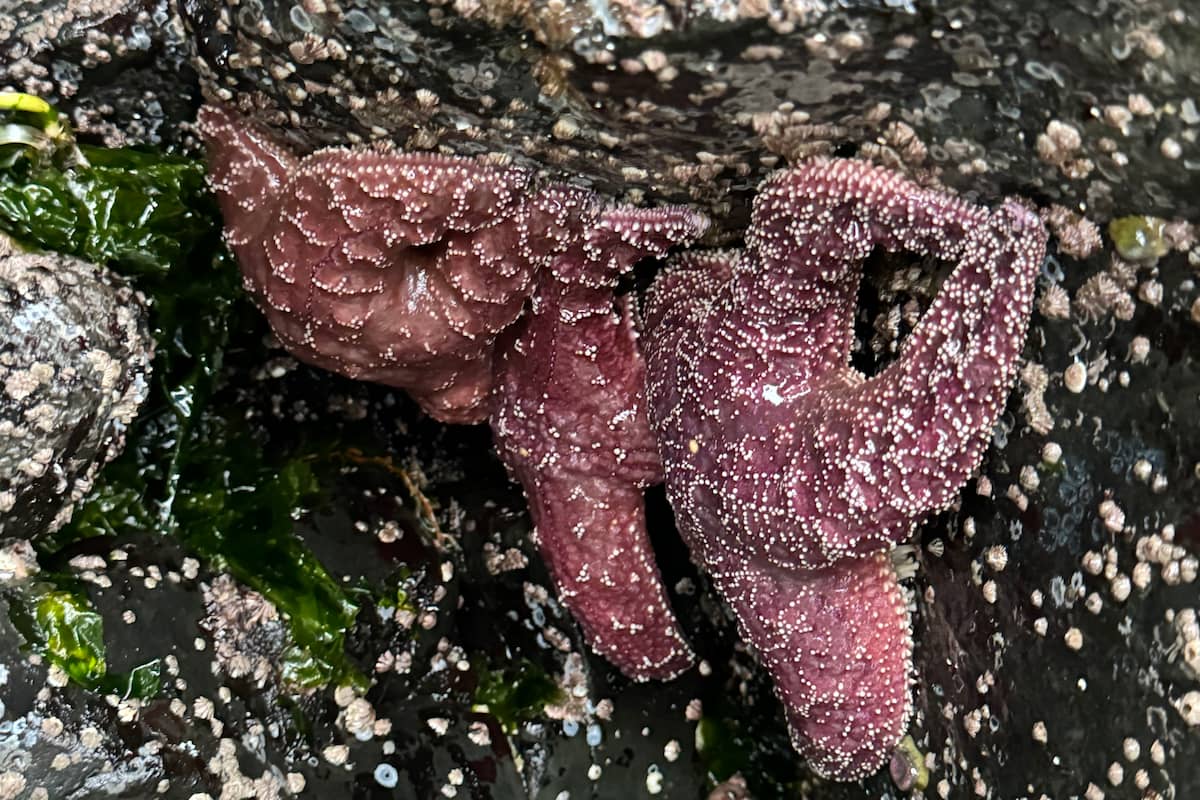
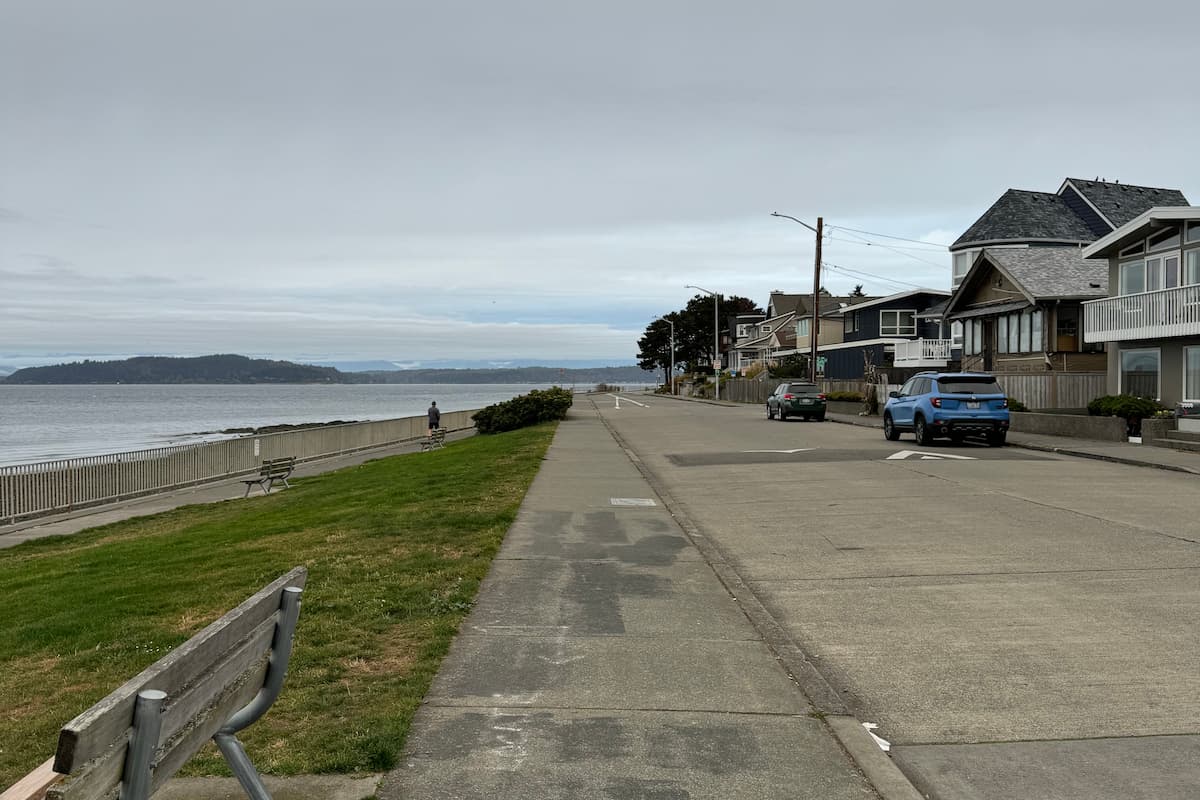


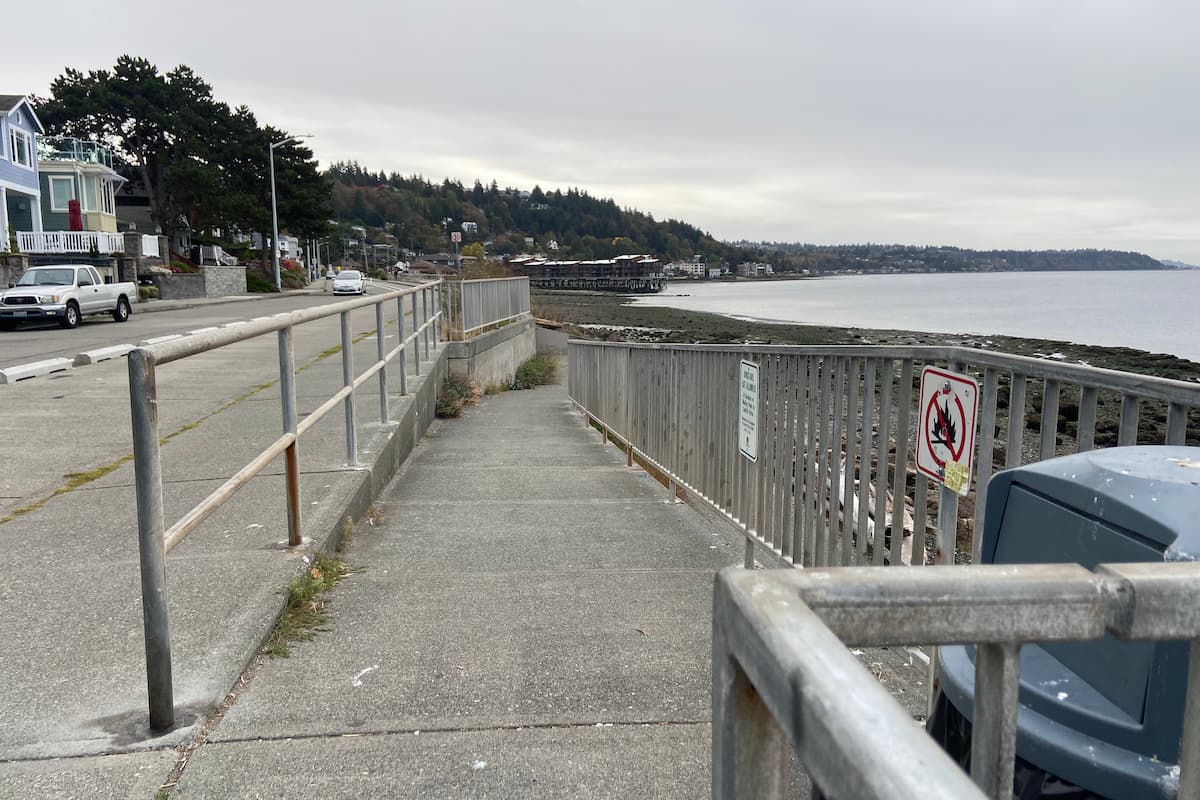

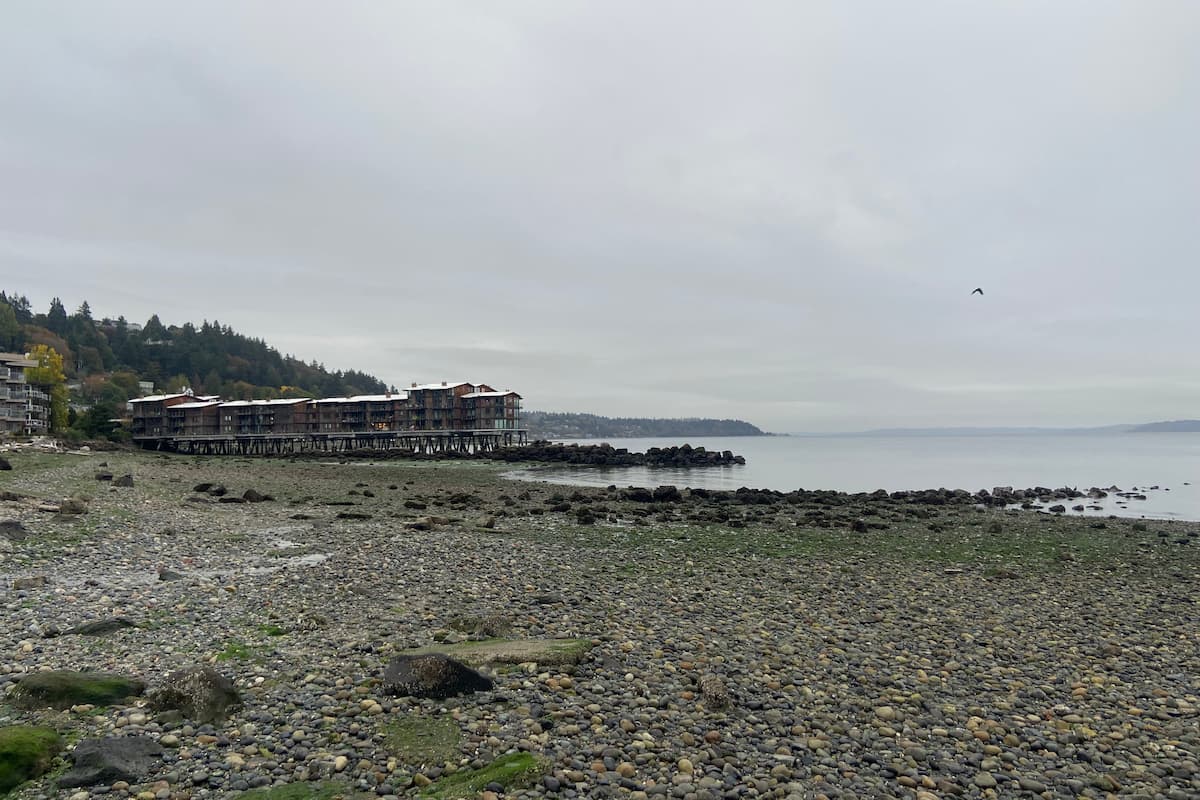
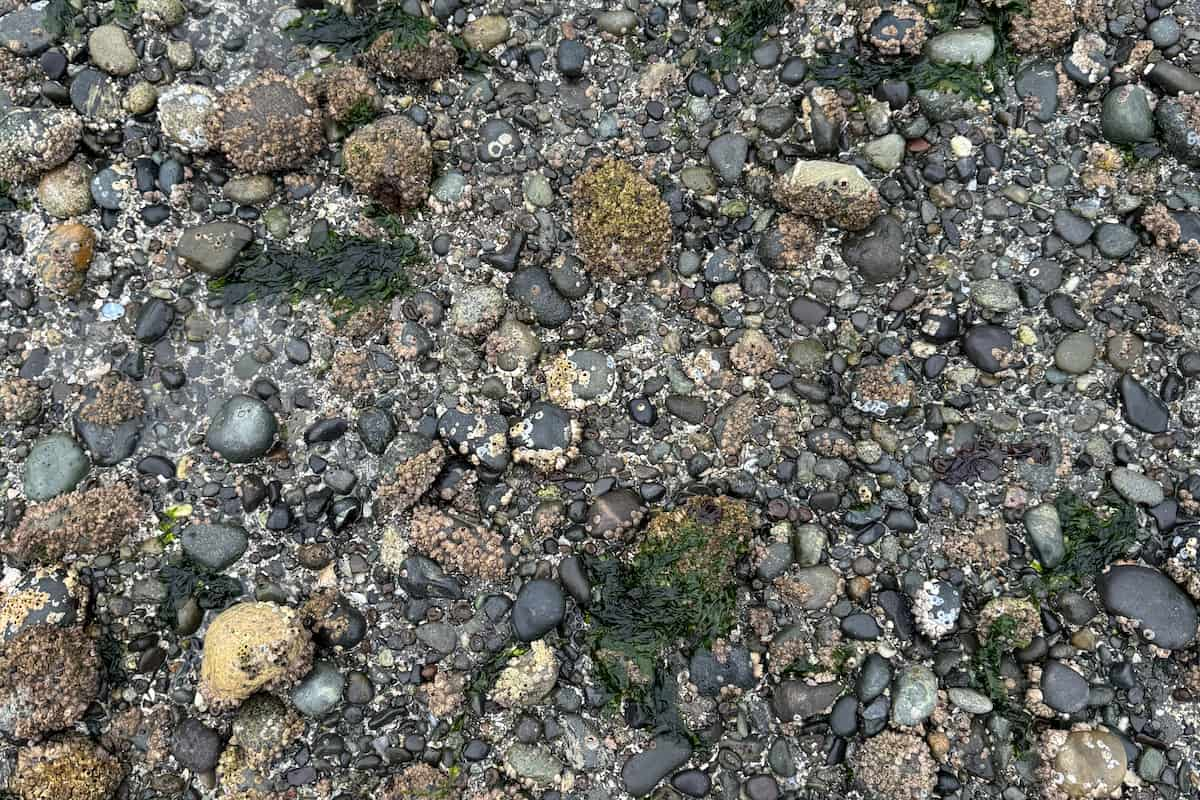
Dash Point State Park
- Address
5700 SW Dash Point Road, Federal Way, WA 98023
- Land acknowledgement
Puyallup, Walla Walla, Umatilla, Cayuse
- About the beach
This park is located just south of Seattle in Federal Way. This is a popular site to camp and take in views of Puget Sound and the Olympic Mountains. This park has many picnic tables and reservable shelters for daytime use. This park has well-maintained, paved pathways for easy beach access. The beach is characterized by soft sand, algae and rocks. There is a creek that runs through the middle of the beach. The beach is very slippery, so footwear with excellent traction is recommended.
- Park hours
Every day 8am to dusk
- Parking
This park has a large parking lot with plenty of room for bus drop off. The parking lot is located next to a picnic area with reservable tables and covered shelters. The parking lot is a 5-minute walk to the bathrooms and the start of the beach. A Washington State Parks Discover Pass is required for entry to the park. You can purchase a day-use or a yearlong pass online. A day-use pass costs $11.50 and a year pass is $35. There is also a kiosk located in the parking lot. This grants you access to over 100 state parks. Note that some public-school buses have exempt license plates meaning that they can enter the park without a Discover Pass, but make sure to double check with your district’s bus company before arriving.
- Bathrooms
There are gendered restrooms close to the beach, each including a large stall with ramps. This restroom does not have changing tables available.
- Accessibility
This beach has paved, well-maintained pathways from the parking lot through the start of the beach. There is ramp access to picnic areas which are stationed on dirt and grass patches. The pathway near the start of the beach has a small lip where it becomes dirt instead of pavement. The start of the beach is obstructed by various rocks and logs. Facing the beach, go to the leftmost entry point (through the grassy area). There are two dirt pathways (one is 58 inches in width, the other is 28 inches at its narrowest point) that are less obstructed and lead directly onto the sandy beach with minimal rocks. Using these pathways would mean you can only access the left side of the beach (when facing the water). There is a creek running through the middle of the beach that can be traversed. Navigating a long distance through slippery substrate is required to get to the water. A beach chair is recommended for those who would have trouble navigating this without a mobility device. For shade, there is tree cover near the high tide area of the beach in addition to several reservable shelters near the picnic area. There is a water spigot at the restrooms near the beach for drinking and rinsing.
- Animals you might meet
Sand dollars, moon snails, hermit crabs, sea anemones
- Best tide level
This beach is especially great for super low tide days. Ideally, you would be visiting this beach when the tide is at a minimum of -2 feet. Fun can still be had at the beach even if the tide isn’t super low by looking out for megafaunas such as sea lions, harbor seals and harbor porpoises swimming by.
- NOAA buoy
- Website
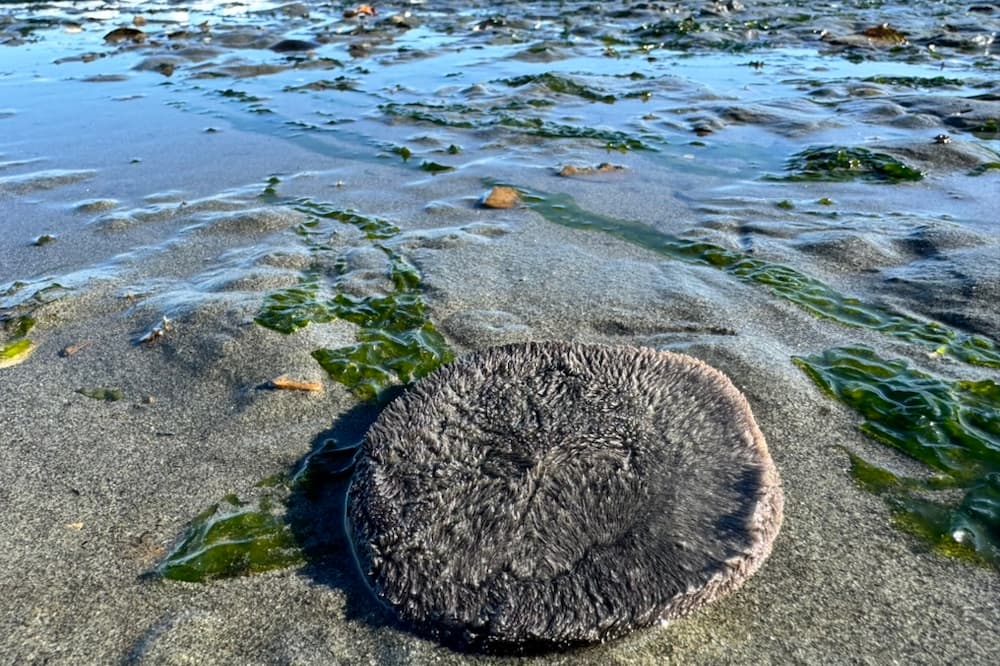
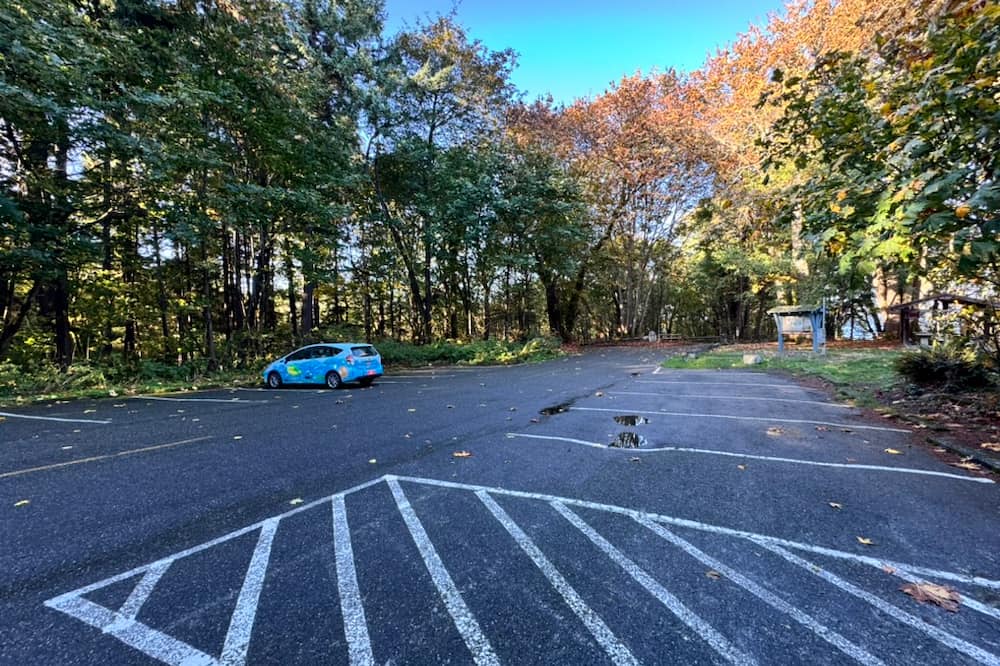
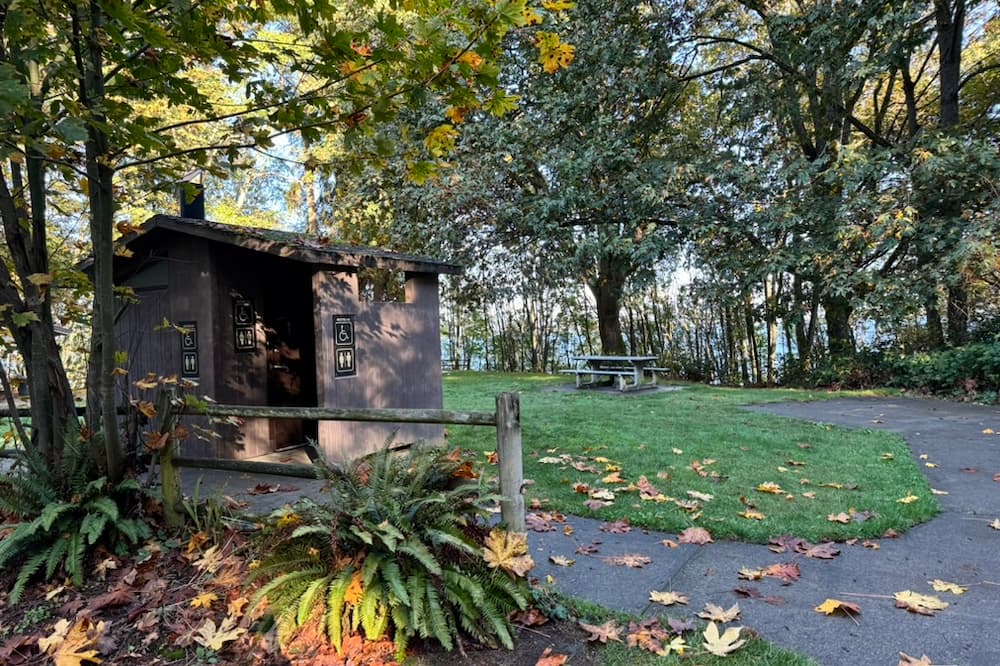
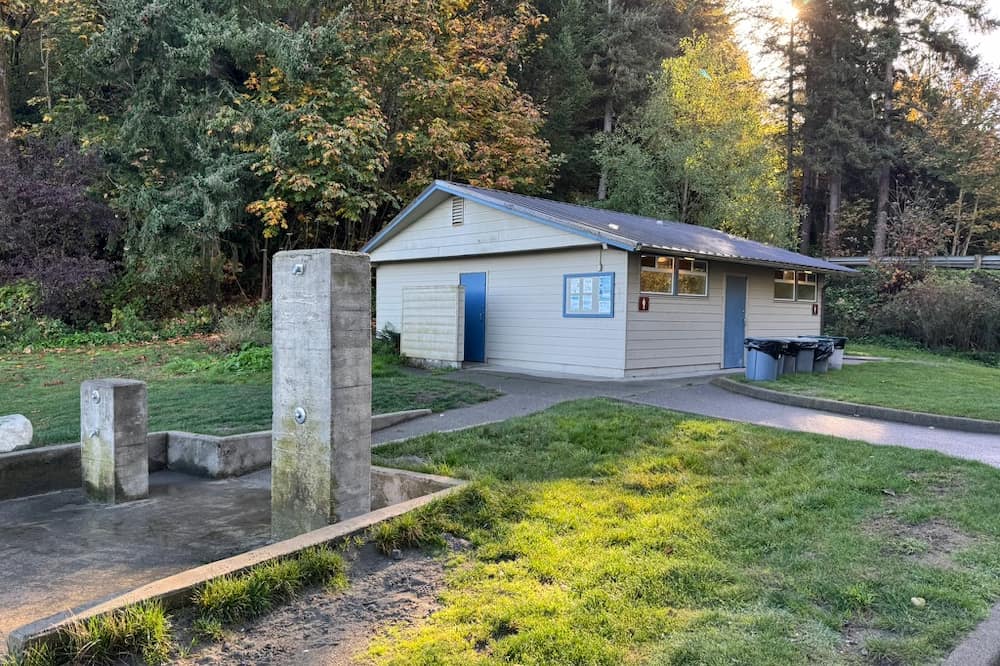
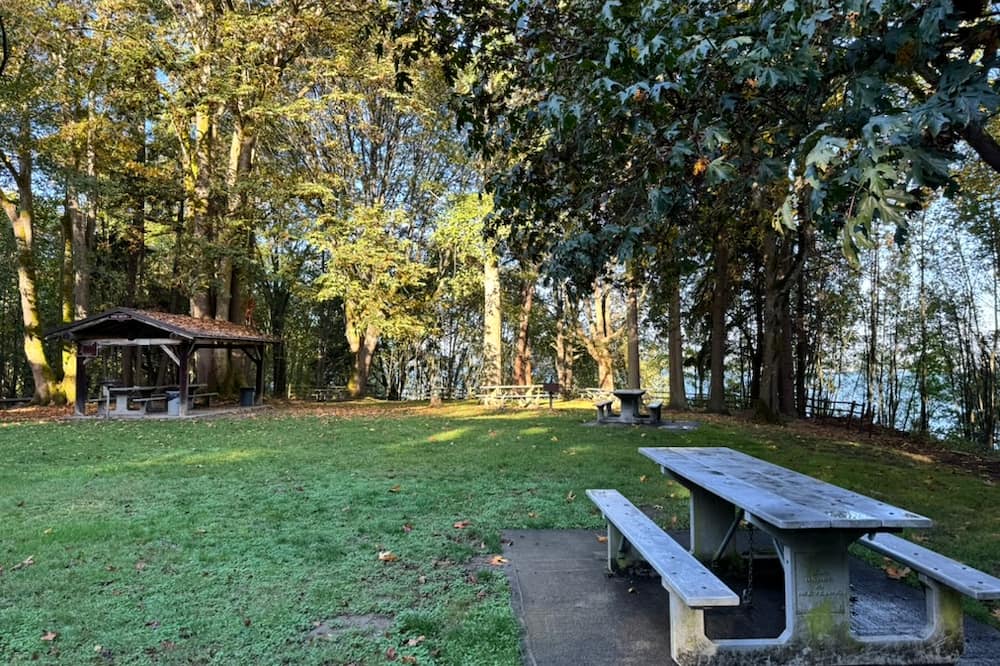
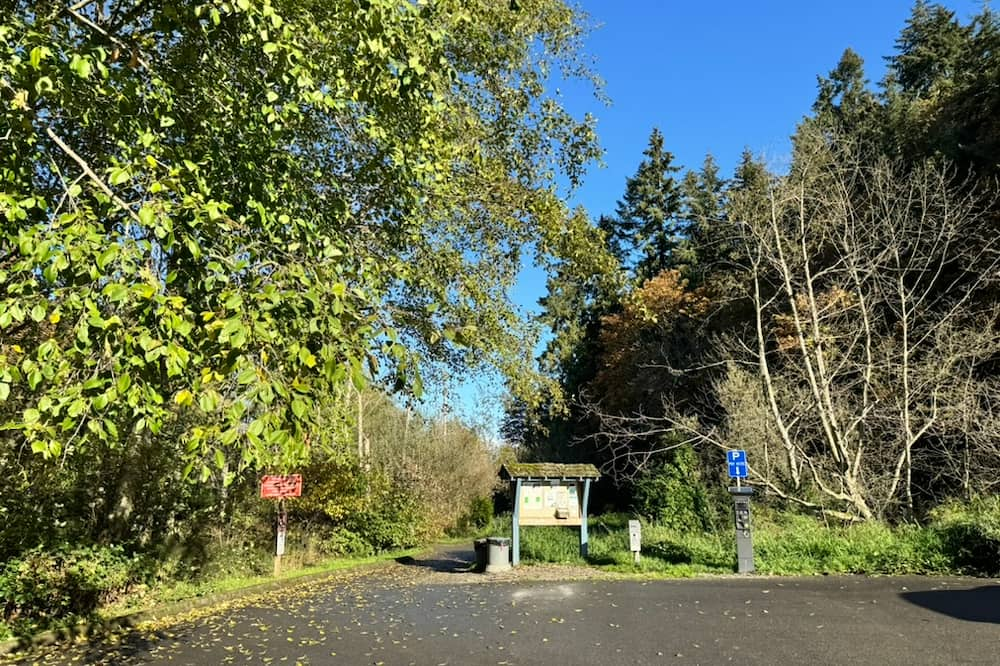

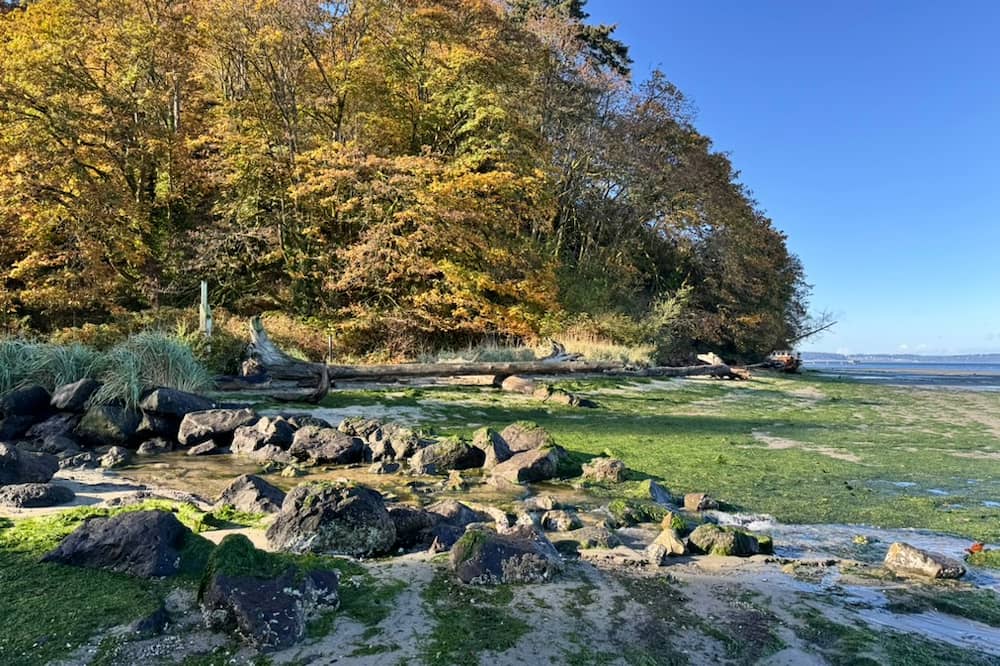
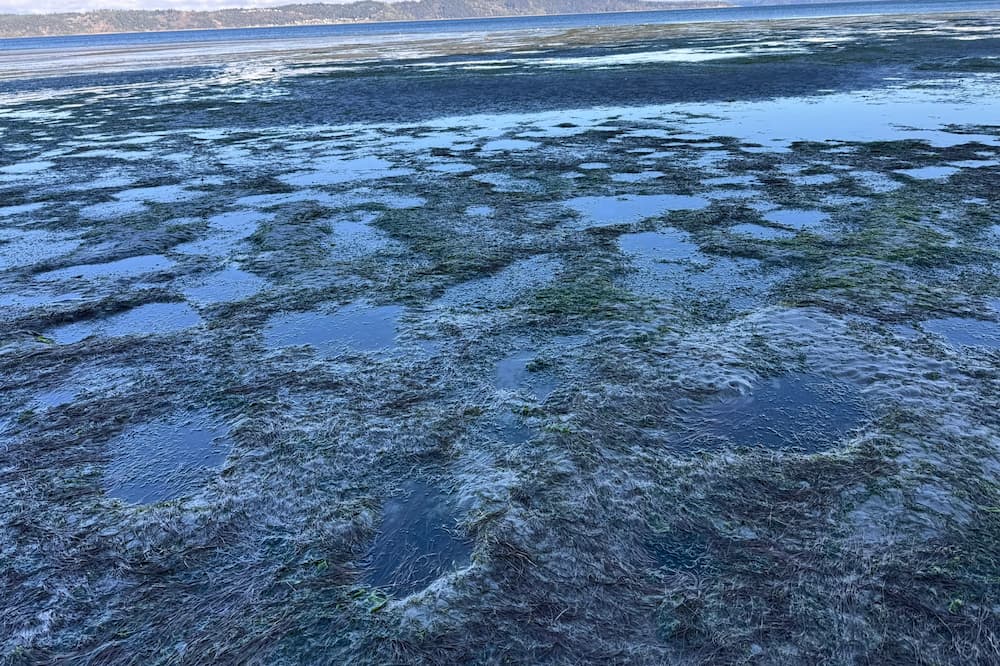
Golden Gardens Park
- Address
8498 Seaview Place NW, Seattle, WA 98117
- Land acknowledgement
Tulalip, Duwamish, Suquamish
- About the beach
This is a very popular Seattle park. There are a variety of habitats to investigate at this location. The beach is characterized by mostly sand on the south end but as you walk north along the shore, the substrate turns to cobble and larger rocks. There is plenty of parking, access to bathrooms, shelter and a potable water source. At the far end of the parking lot, there is a restored wetland area with a wooden pathway that allows northern beach access. If you walk all the way to the north end of the park at low tide, you can follow the railroad tracks to the right to find large boulders covered in tide pool animals. There are large eelgrass beds all over the beach so make sure to watch where you step.
- Park hours
Every day 4am to 10:30pm
- Parking
This beach has lots of parking and a large turn-out for buses to drop people off. The beach access parking area fills up quickly on nice days, but there is additional parking available in an overflow lot above the park. You can find paid parking at the marina nearby, as well as street parking outside of the park.
- Bathrooms
This beach has gendered, ADA-compliant restrooms that can be found in the building near the playground and basketball court.
- Accessibility
There is little to no shade on the beach depending on the time of day you visit. There are some trees near the pond, by the bathhouse and near the picnic shelters that provide shade. Water fountains are next to the bike rack at the playground and the south end of the bathhouse. There is also running water at two of the shelters near the water fountain.
- Animals you might meet
Sea snails, small and large crabs, hermit crabs, chitons, mussels, limpets, geoducks, gunnels, clingfish, moon snails, giant blue heron, harbor seals, sea lions
- Best tide level
Visiting this beach is not tide dependent. Ideally, plan to go on a day that has a low tide of anything below 3 feet, but you will be able to observe interesting things even if the tide is higher. If you plan to try and access the larger rocks on the northern side of the beach, you will want to have a low tide of at least 1 foot or lower.
- NOAA buoy
- Website
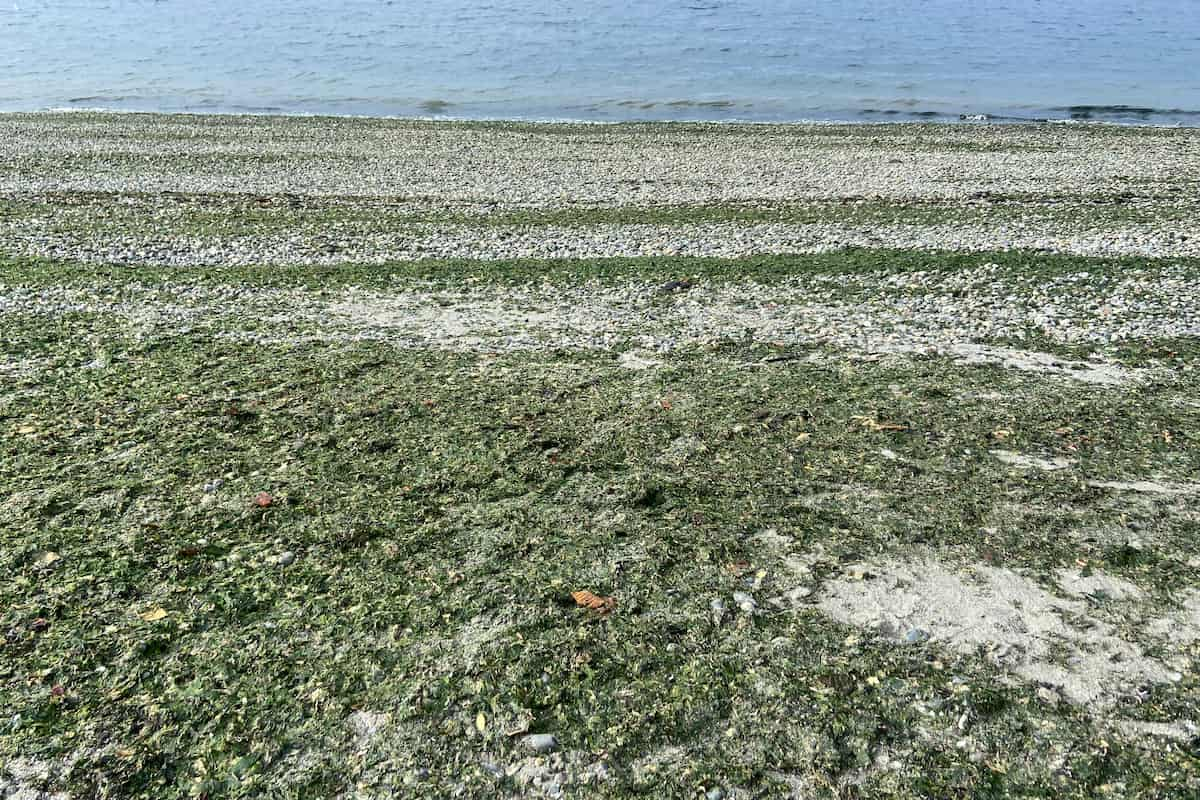
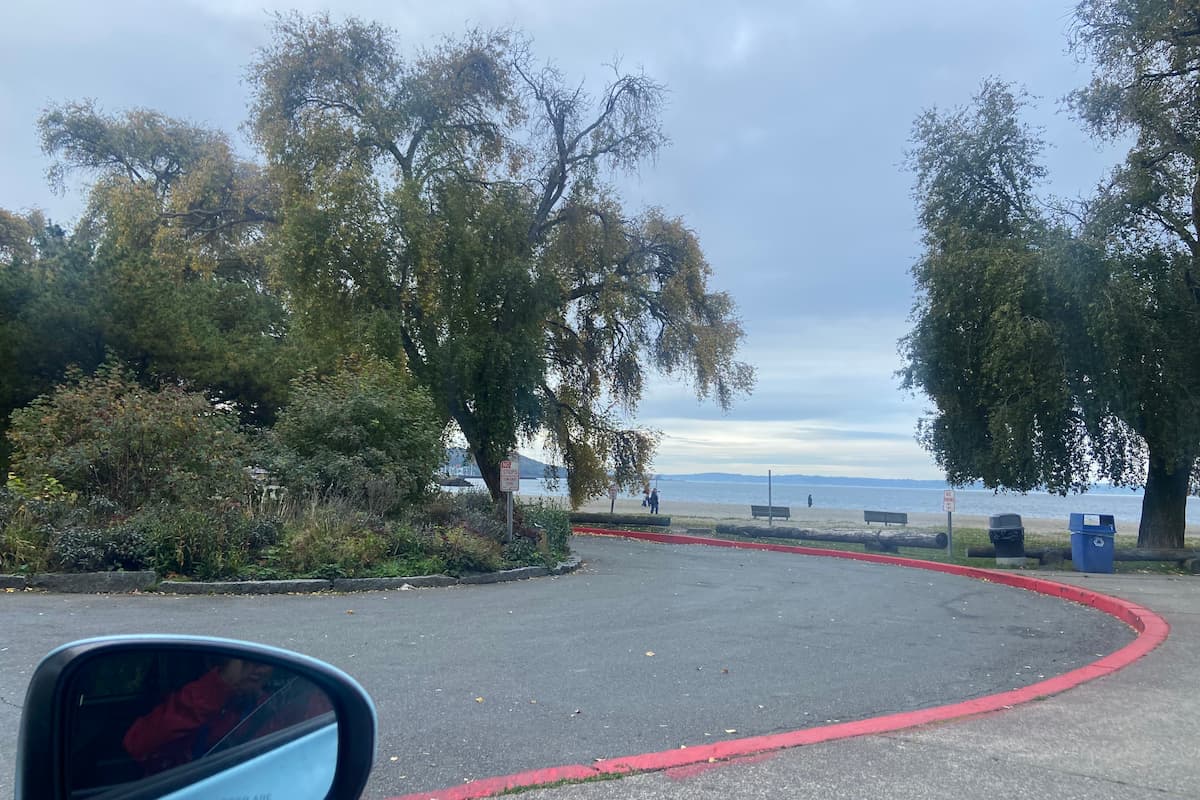
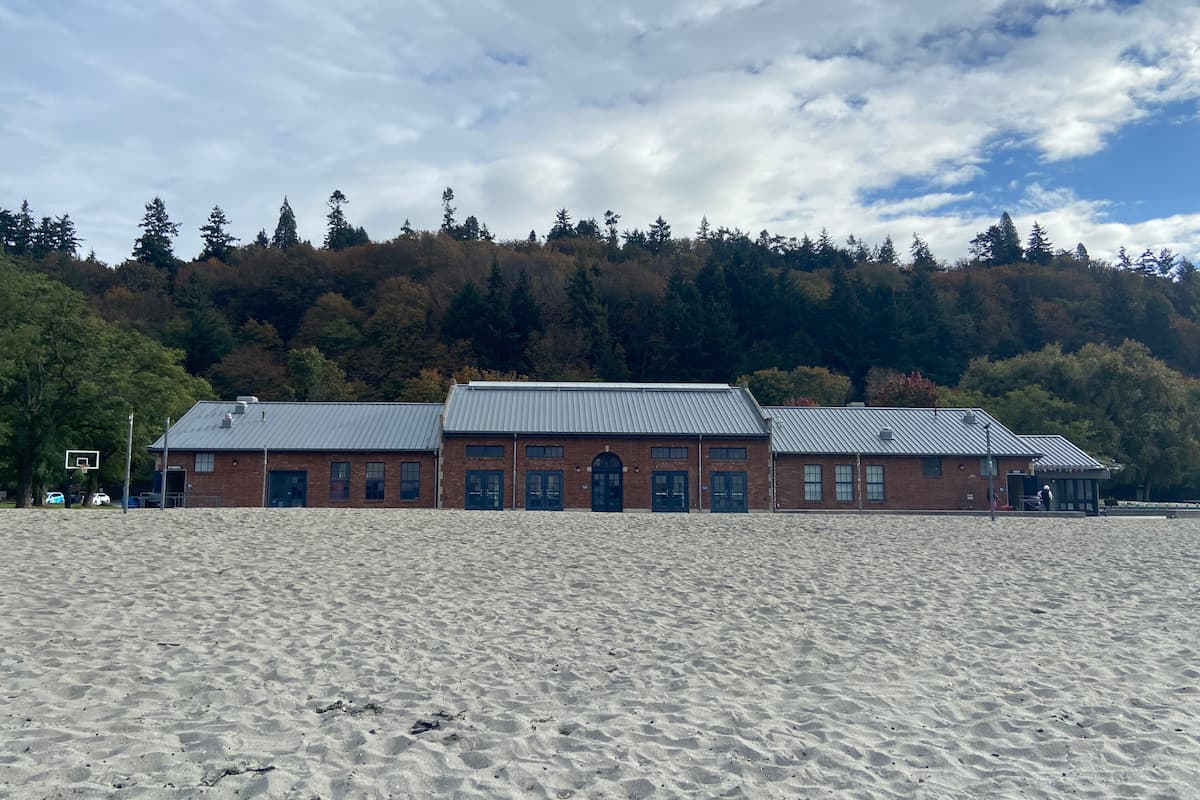
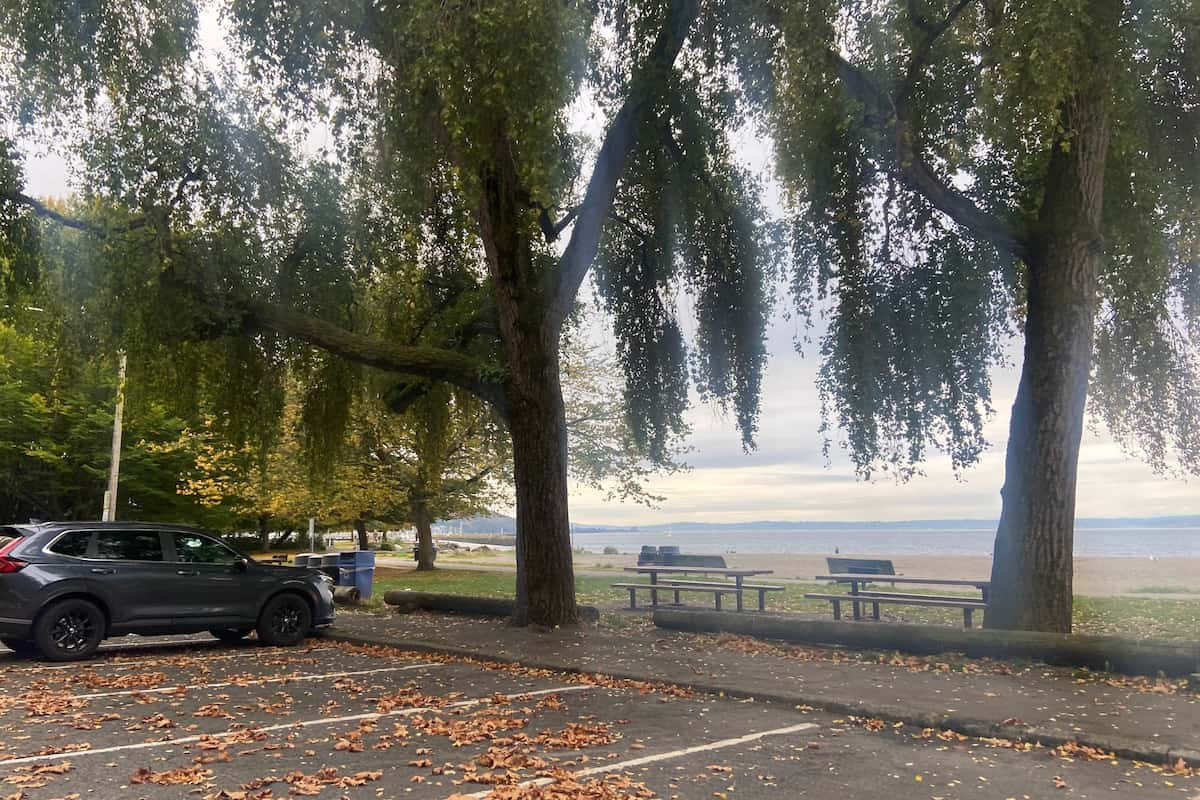
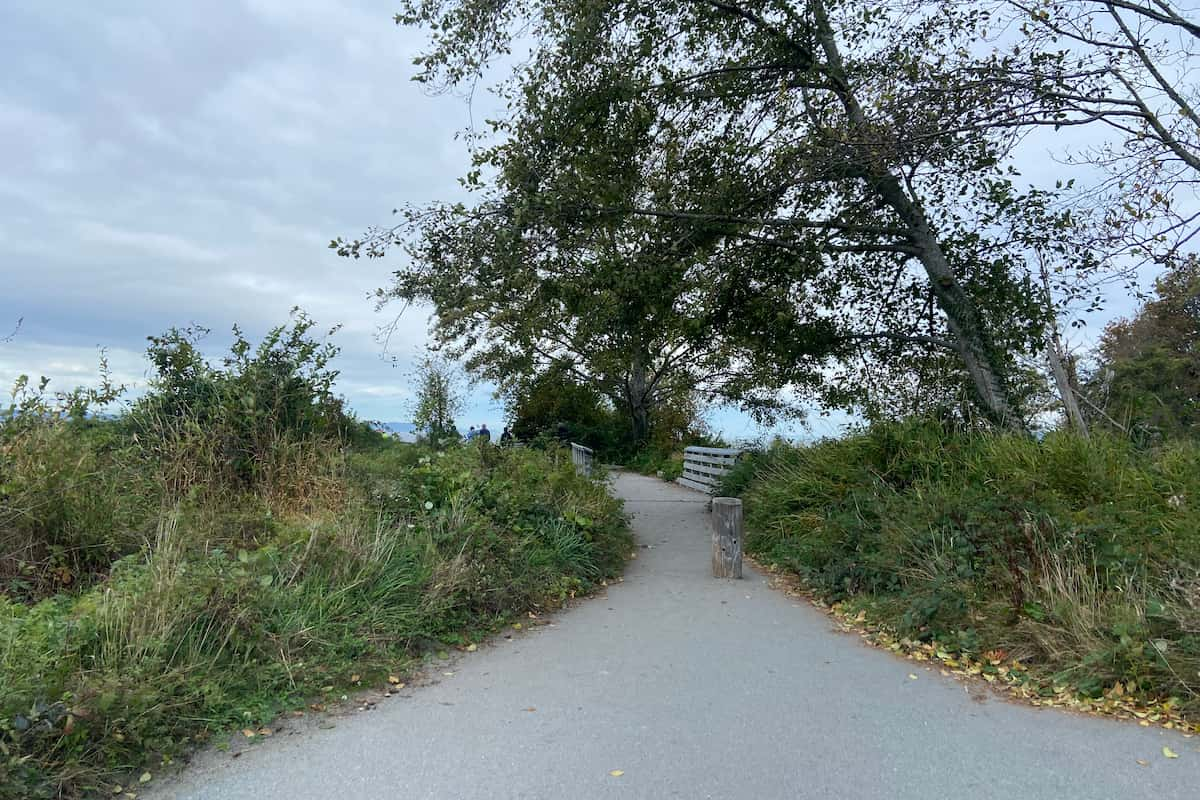
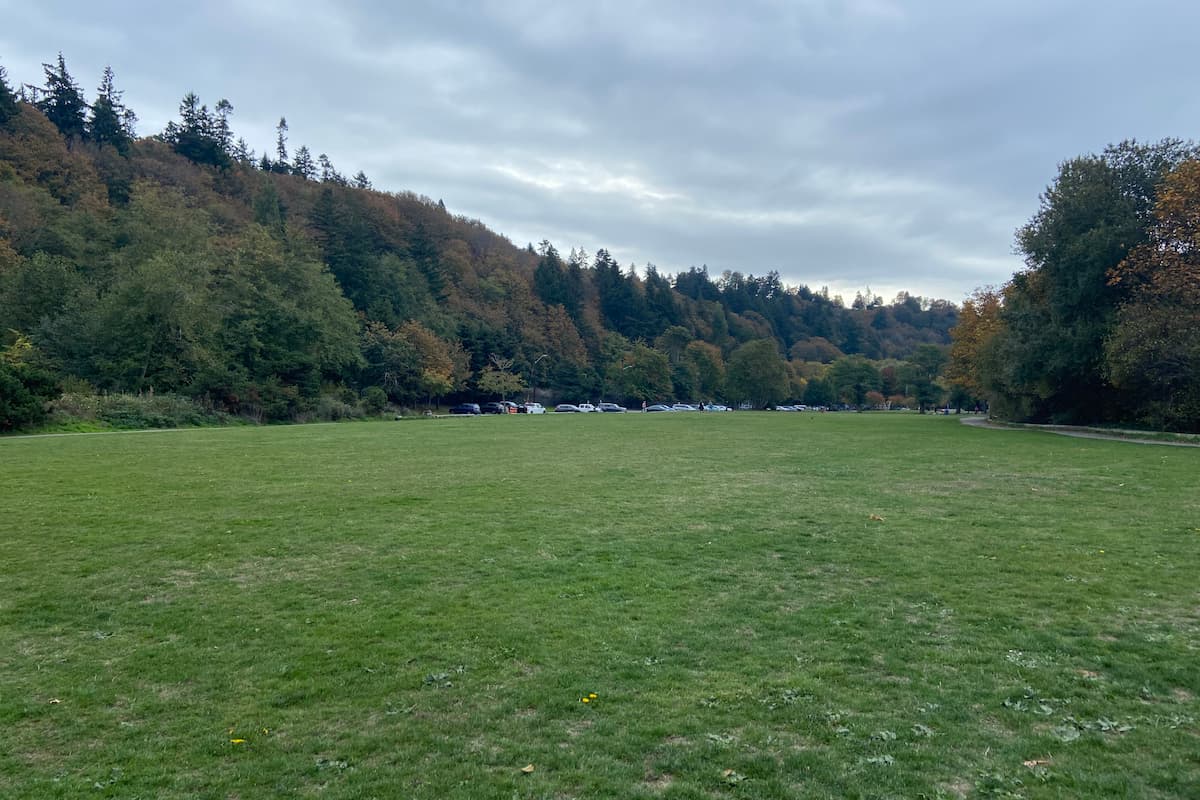
Lincoln Park
- Address
8011 Fauntleroy Way SW, Seattle, WA 98136
- Land acknowledgement
Duwamish, Tulalip, Muckleshoot, Suquamish, Walla Walla, Cayuse, Umatilla
- About the beach
This is a large park located in the West Seattle neighborhood. The park has several amenities such as bathrooms, playgrounds, hiking trails and picnic areas to choose from. There are two large parking lots and a parking lot reserved for people with disability placards next the paved path that runs along the beachfront. This beach is great for watching megafaunas like sea lions, harbor seals, harbor porpoises and orcas.
- Park hours
Every day 4am to 11:30pm
- Parking
The parking here is free; however, the lots may fill up quickly on weekends and sunny days. The parking lot closest to the beach is located at the cross section of Fauntleroy Way SW and SW Cloverdale Street. At the south end of the parking lot, there is a small access road to a lower lot that is only for cars with disability placards, since it is easier to access the beach and running path from there. Large school buses wouldn’t be able to access this area. If parking in the nearby neighborhood, please be mindful of the ferry lane along Fauntleroy Way SW.
- Bathrooms
The closest bathrooms to the beach are located to the right of Beach Shelter No. 3. These gendered restrooms have a large and small stall. The doorframe to enter the bathrooms is only 36 inches wide, which can be difficult to enter if someone uses a larger wheelchair.
- Accessibility
There are many reservable shelters located in the park and along the beach pathway. Tall trees and the picnic shelters provide ample space for getting out of the elements, however there is no shade on the beach itself. Potable water can be found at the drinking fountain by the restrooms. There is also a foot bath and pet water station. The pathways at this park are flat, paved and well maintained. The route down to the beach from the parking lot is steep, so someone with limited mobility might encounter difficulties. We recommend accessing the beach from the small access road at the far end of the parking lot. There is a paved path that follows the road down. The substrate on the beach itself is comprised of both sand and cobble. There is some algae on the rocks which can be slippery, so wearing appropriate footwear is important.
- Animals you might meet
Aggregating anemones, shore crabs, hermit crabs, barnacles, sea stars, sand dollars
- Best tide level
This beach is best for tide pooling at levels lower than 1 foot. Fun can still be had at the beach even if the tide isn’t super low by looking out for megafaunas such as sea lions, harbor seals and harbor porpoises swimming by. Don’t forget to bring binoculars!
- NOAA buoy
- Website
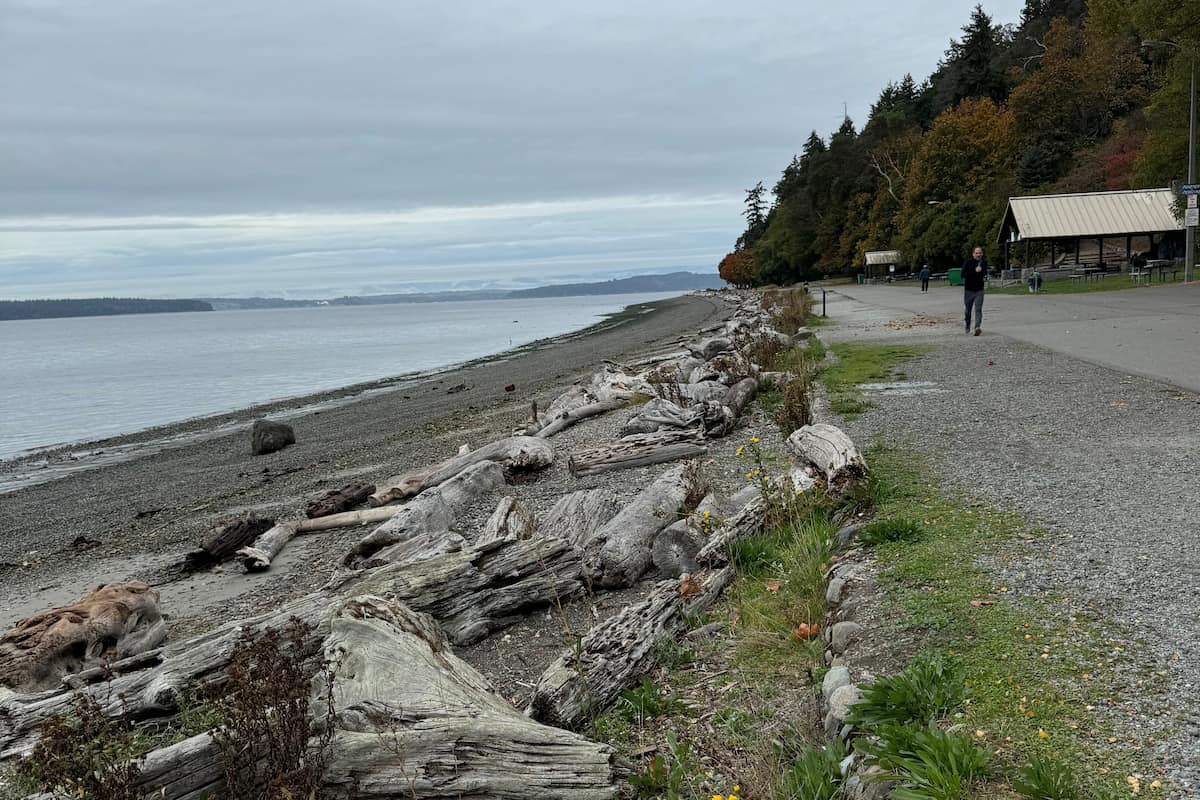
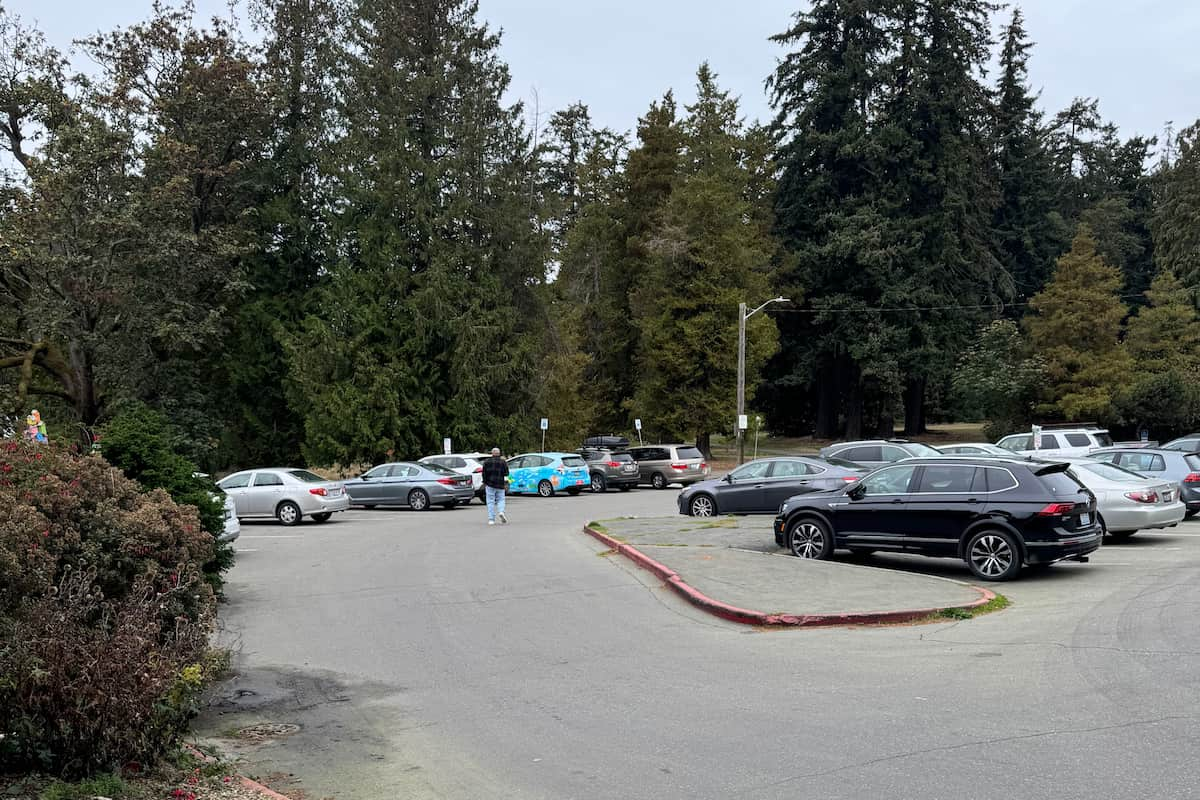
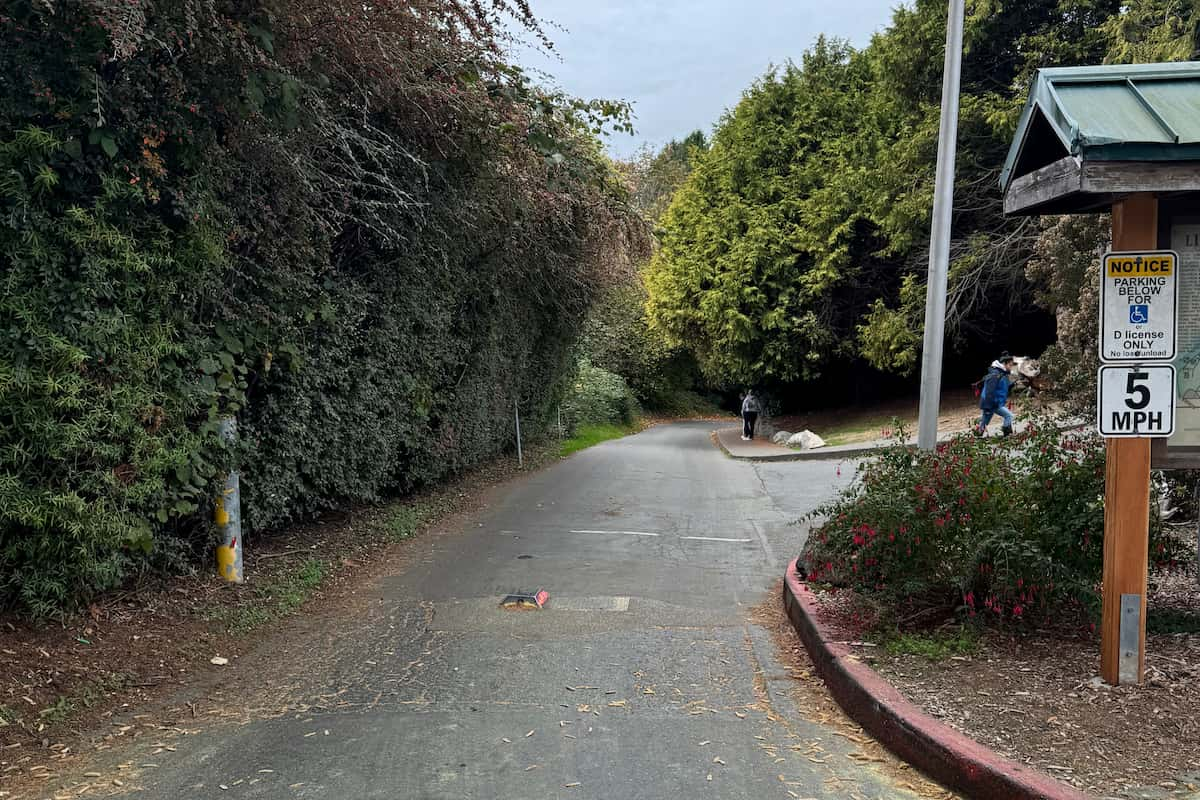
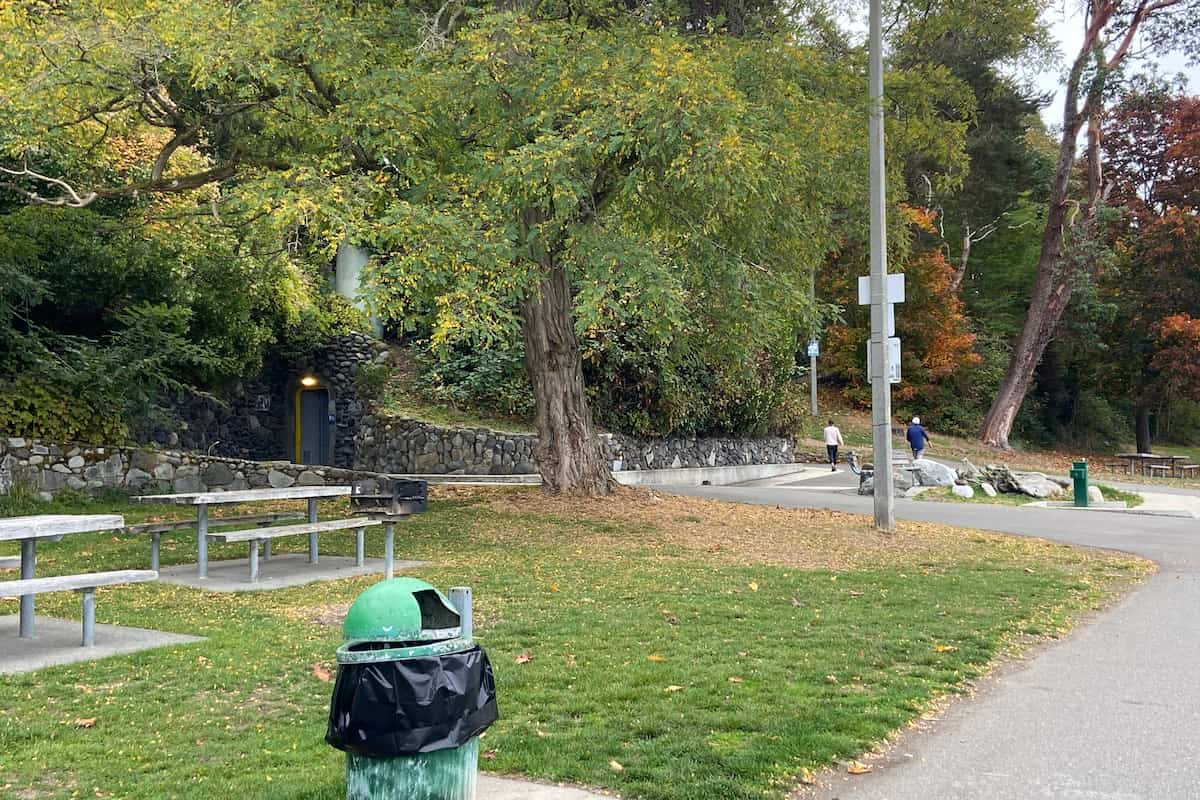

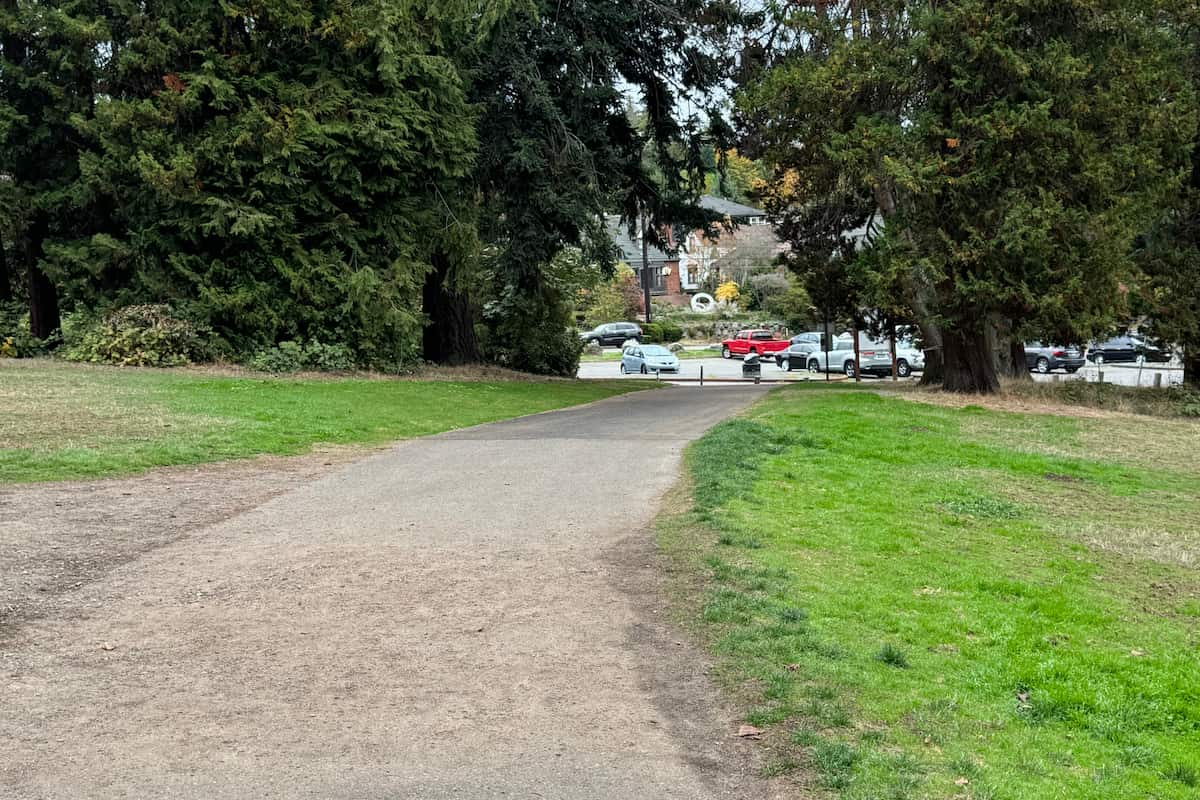
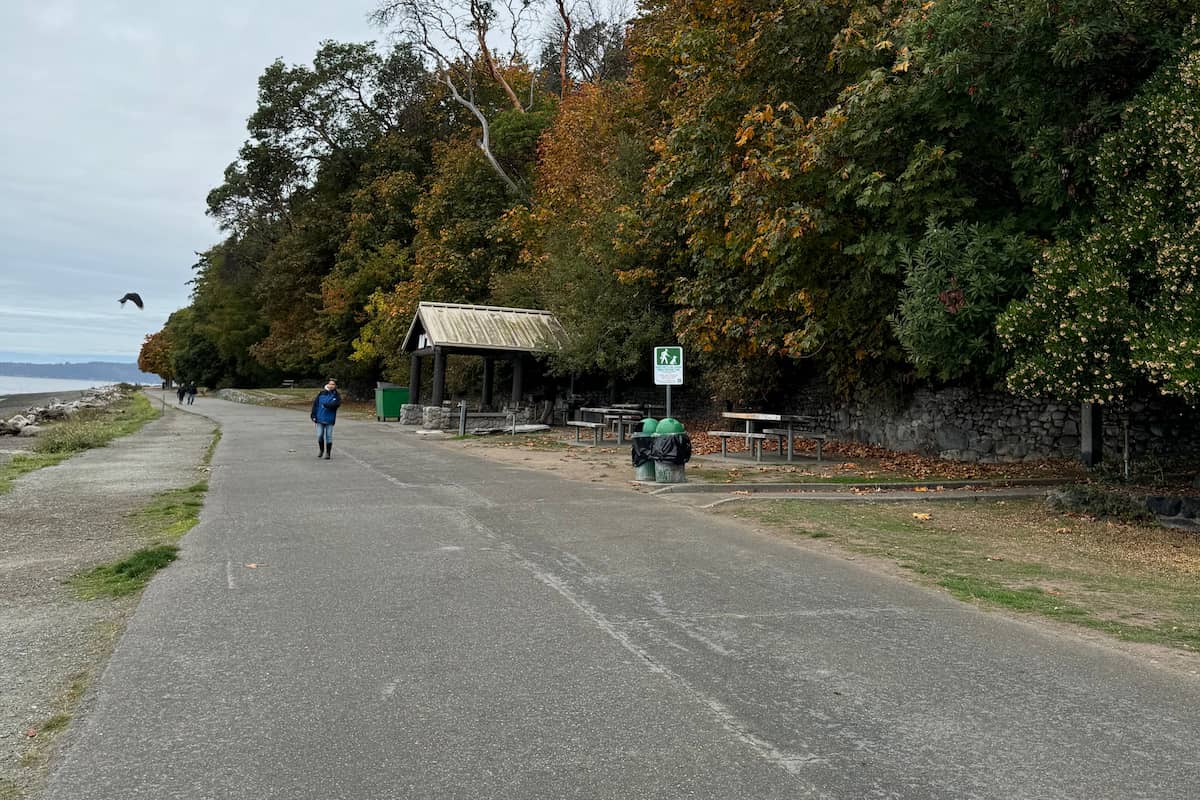

Mukilteo Lighthouse Park
- Address
609 Front St, Mukilteo, WA 98275
- Land acknowledgement
Snohomish, Suquamish, Umatilla, Walla Walla, Cayuse, Tulalip
- About the beach
This is a large public park located north of Seattle. Its main feature is a large lighthouse that is sometimes open to the public. The beach itself is characterized mostly by small cobble which can be difficult to walk on without sinking in. The beach is relatively flat, which is why looking at the tide height is especially important because the water covers the entire beach at times. As the tide goes out, there is an abundance of life under the rocks. Turning them over by using one gentle hand will reveal crab parties, snails hanging out and maybe even a gunnel.
- Park hours
Every day 6am to 10pm
- Parking
There is a paid parking lot as well as street parking available at Lighthouse Park for $3 per hour. The Lighthouse Park lot has an abundance of parking spaces and plenty of room for buses to pull in, drop off and park. Paid parking hours do vary so make sure to consult the meter.
- Bathrooms
There are gendered, ADA-compliant bathrooms located at the center of the parking lot next to the reservable shelter.
- Accessibility
There is a reservable shelter with picnic tables next to the bathrooms in the parking lot that provides shade access. There are water fountains next to the bathrooms in case students need to fill up water bottles. The beach itself has no shade, and it is entirely covered in small rocks which can be difficult to walk on. There are no ramps onto the beach but a small ledge that you must step down from. There are driftwood logs to sit on at the top of the beach. There is a paved pathway that stretches parallel to the beach for those who do not want to get wet.
- Animals you might meet
Shore crabs, anemones, hermit crabs, ochre stars, gunnels, mussels, limpets, barnacles
- Best tide level
This beach is especially great for super low tide days. Ideally, you would be visiting this beach when the tide is at a minimum of –2 feet. Fun can still be had at the beach even if the tide isn’t super low by looking out for megafaunas such as sea lions, harbor seals and harbor porpoises swimming by. Don’t forget to bring binoculars!
- NOAA buoy
- Website


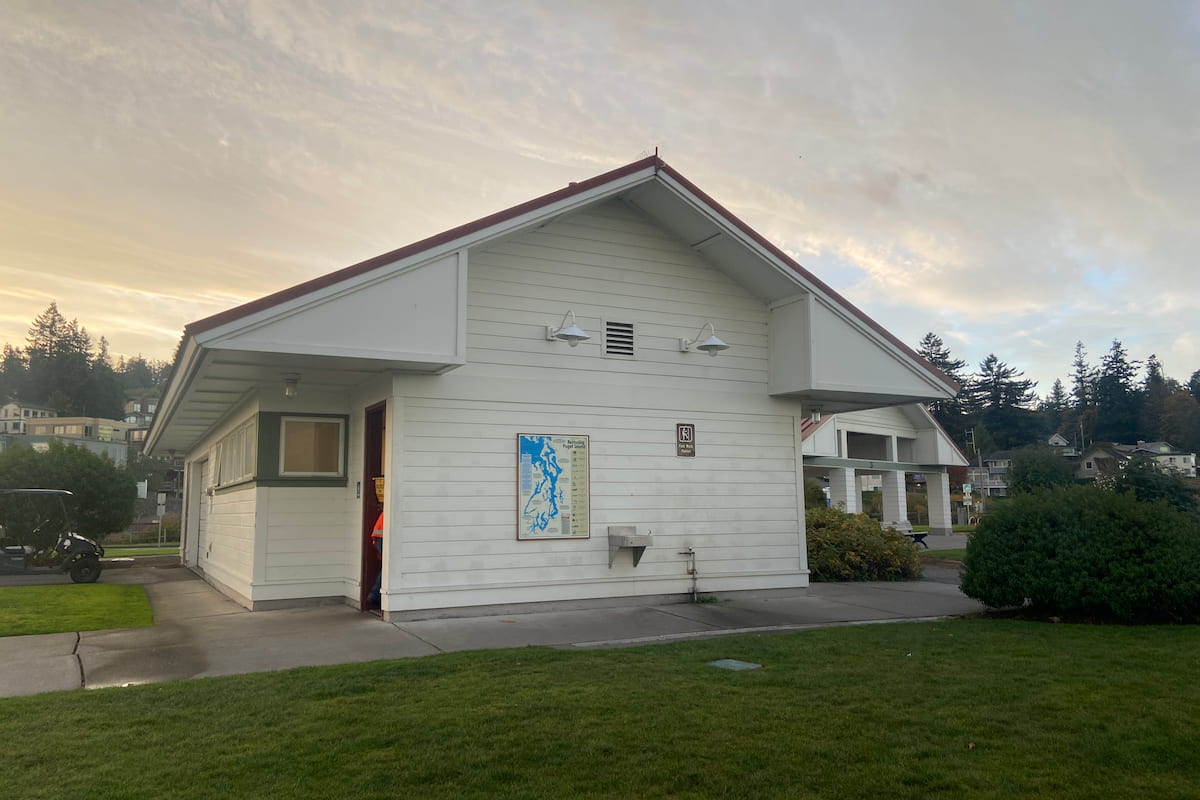
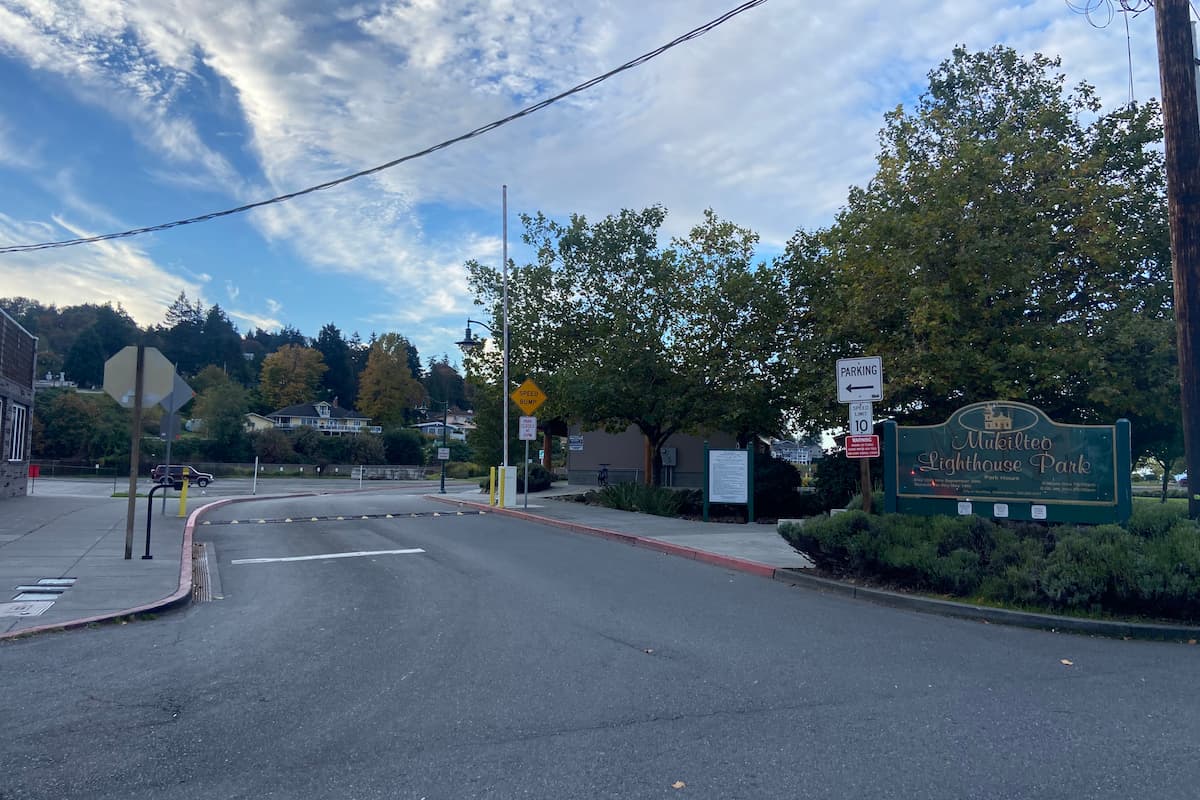
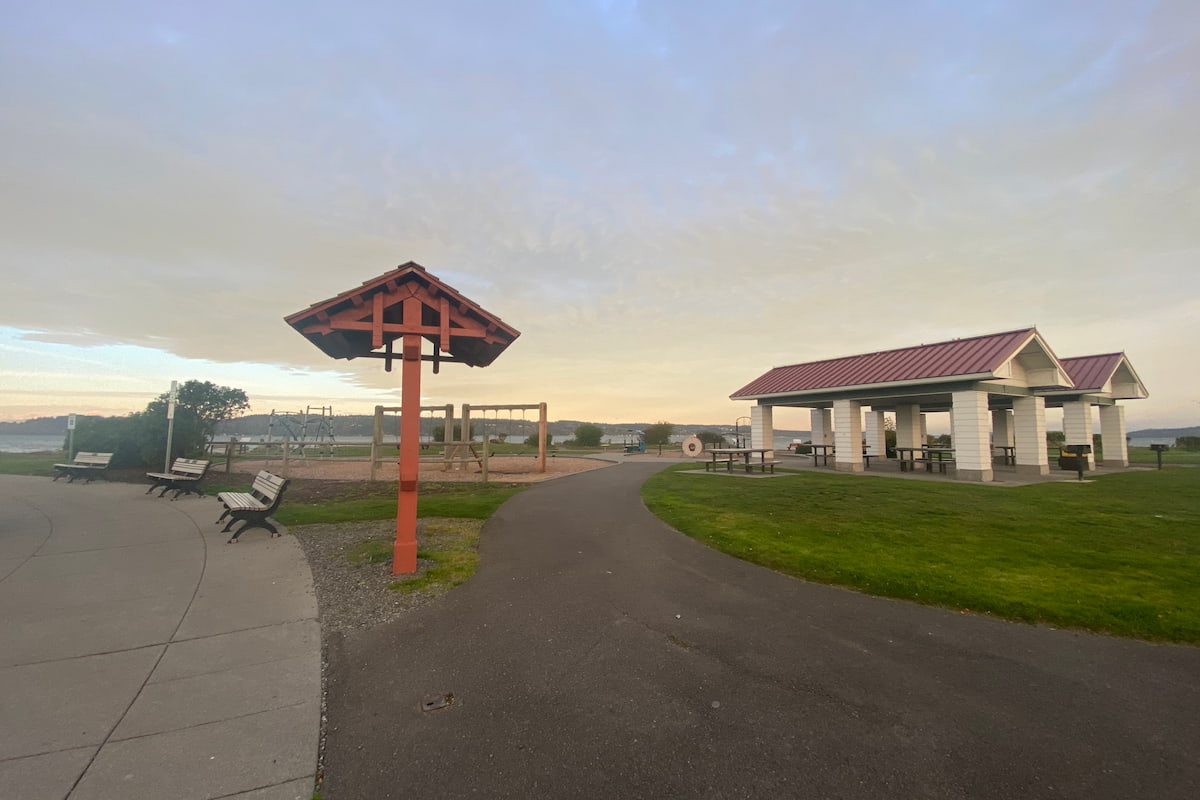
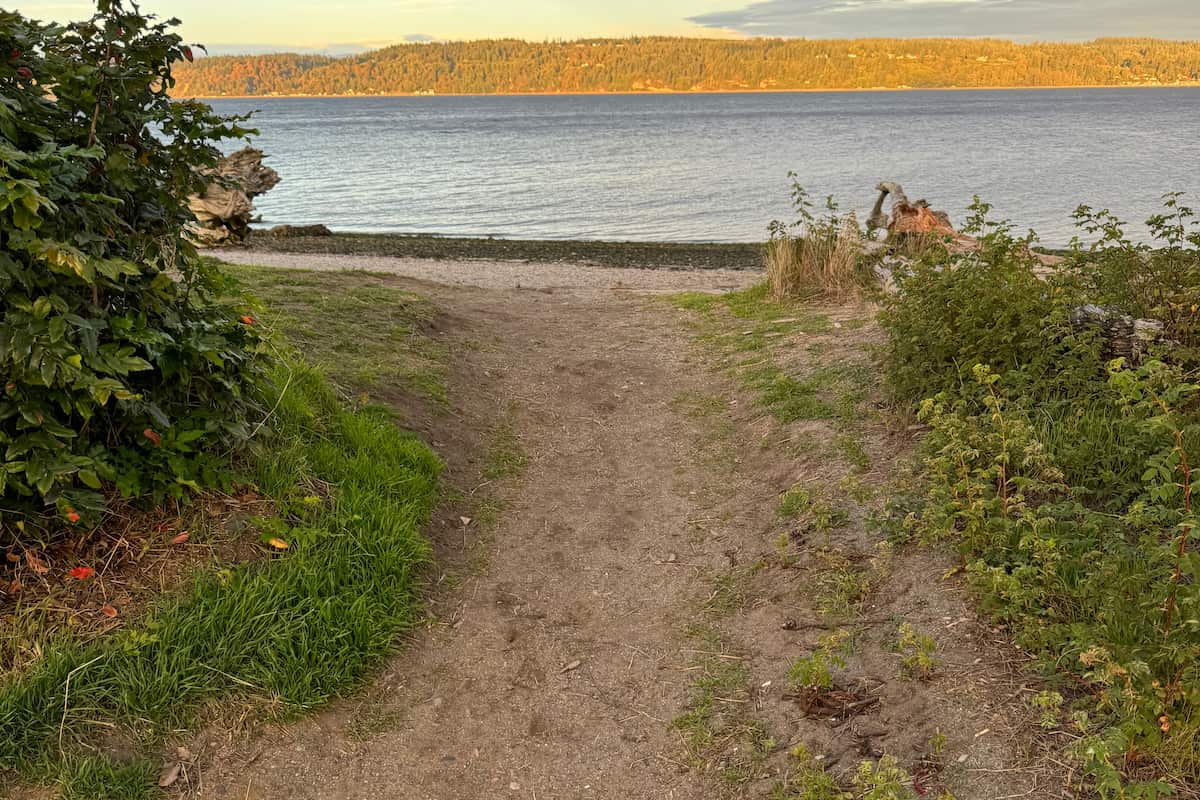
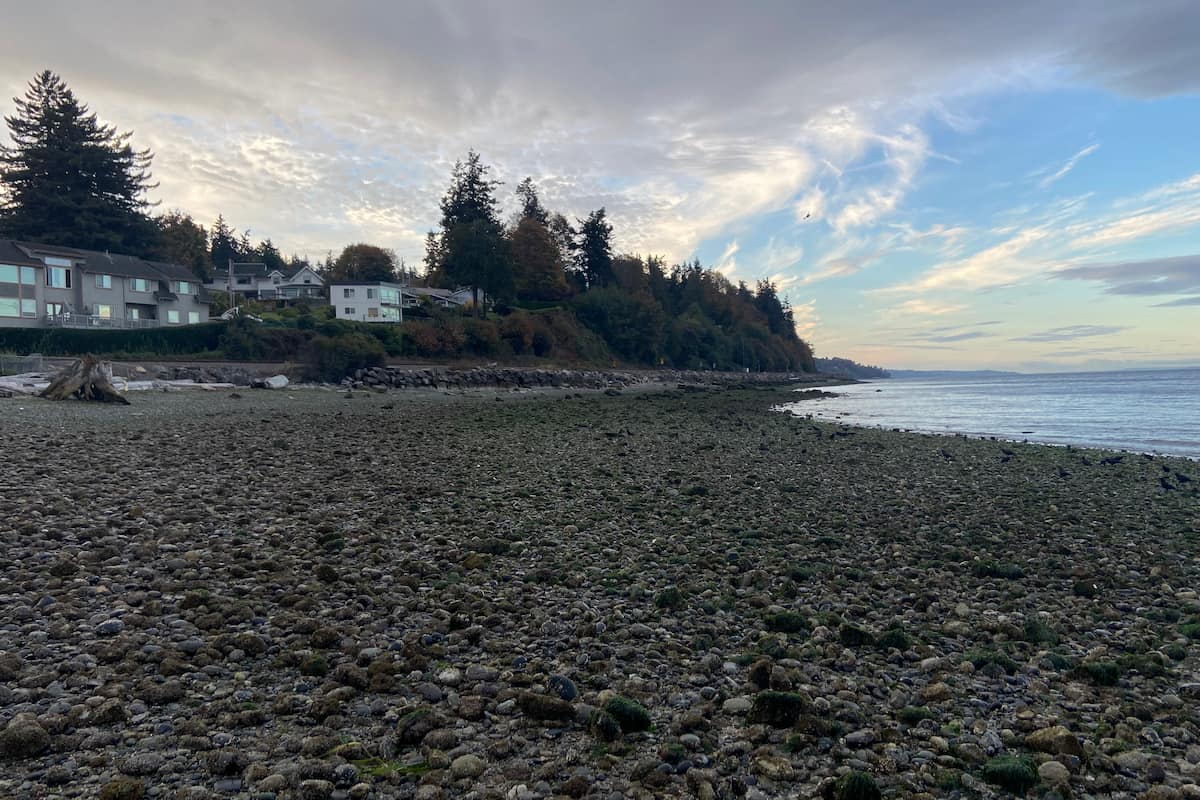
Olympic Sculpture Park Pocket Beach
- Address
3131 Elliott Ave, Seattle, WA 98121
- Land acknowledgement
Duwamish, Muckleshoot, Suquamish, Cayuse, Umatilla, Walla Walla
- About the beach
This beach is located in downtown Seattle, near the Space Needle and Seattle Center. It is a part of the Olympic Sculpture Park which is managed by the Seattle Art Museum. This beach is characterized by large cobble and gravel that is surrounded by large boulders on both the north and south ends. Looking into the cracks between the boulders is where you can find sea life! This spot is great for harbor seal and sea lion sightings. After walking around the beach, the Olympic Sculpture Park is a great place to look at art and enjoy nature.
- Park hours
Every day dawn to dusk
- Parking
Paid parking is available in the PACCAR Pavilion garage, located underneath the Olympic Sculpture Park Pavilion. The entrance to the parking garage is on the southeast corner of the park at Broad Street and Western Avenue. There is metered street parking available on nearby streets.
- Bathrooms
There are no bathrooms on the beach. The closest restrooms are approximately a 10- to 15-minute walk uphill from the beach area, located inside the Olympic Sculpture Park Pavilion. There are gendered, ADA-accessible restrooms located near the elevator.
- Accessibility
This park has well-maintained, paved pathways along the waterfront. There are compacted gravel pathways onto the beach itself. The beach has a steep grade from the top to the water line, so someone with limited mobility would benefit from the use of a beach wheelchair. There are large logs at the top of the beach for sitting that tend to be in the shade. There are some trees along the beach and bike trail that provide more shade at the north end of the pocket beach. There is a large grassy area just north of the beach that has benches and places to rest out of the sun. There is no potable water source at the beach itself so it is recommended to bring a cooler with drinking water. The closest potable water is located in the PACCAR Pavilion, which is a 10- to 15-minute walk uphill from the beach.
- Animals you might meet
Sea stars, northern clingfish, nudibranchs, burrowing sea cucumber, barnacles, mussels, hermit crabs, shore crabs
- Best tide level
This beach is best visited on tides of -2 feet or less to tidepool. There is a large underwater habitat bench on the south side of the pocket beach that is home to lots of marine creatures, but this can only be accessed when the tide is extremely low.
- NOAA buoy
- Website
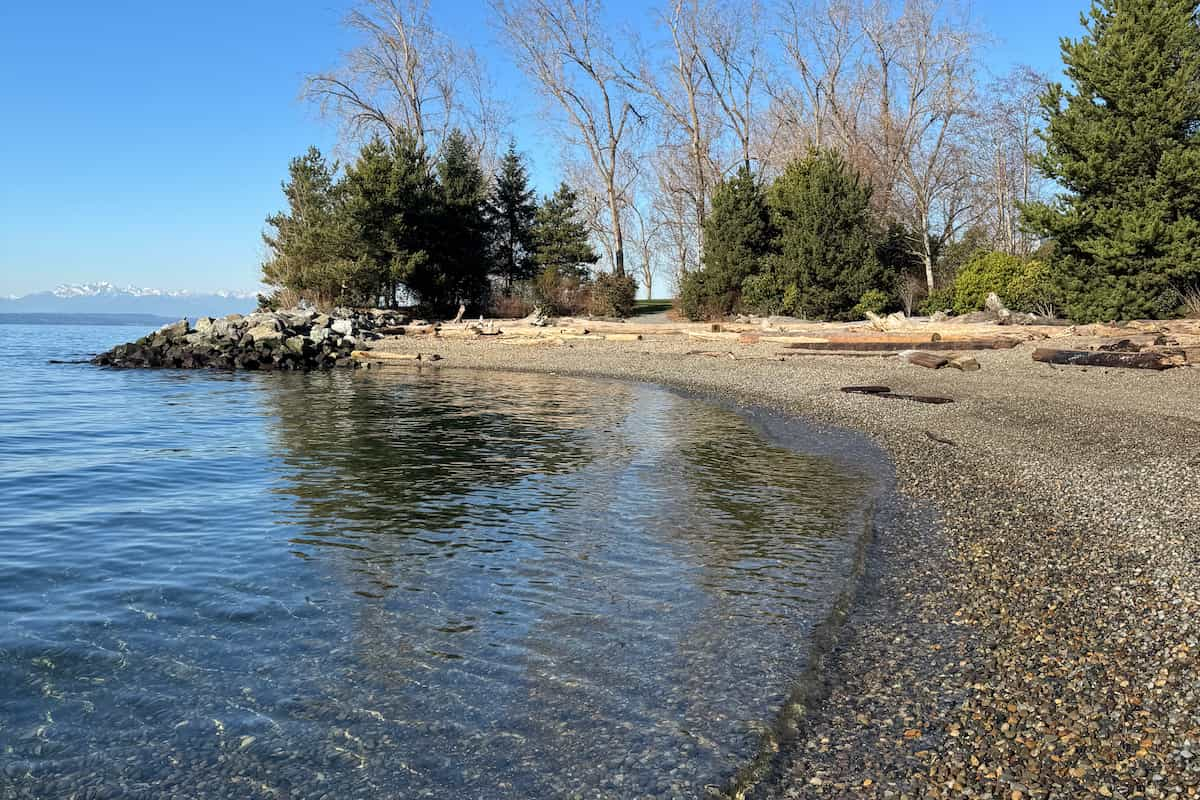
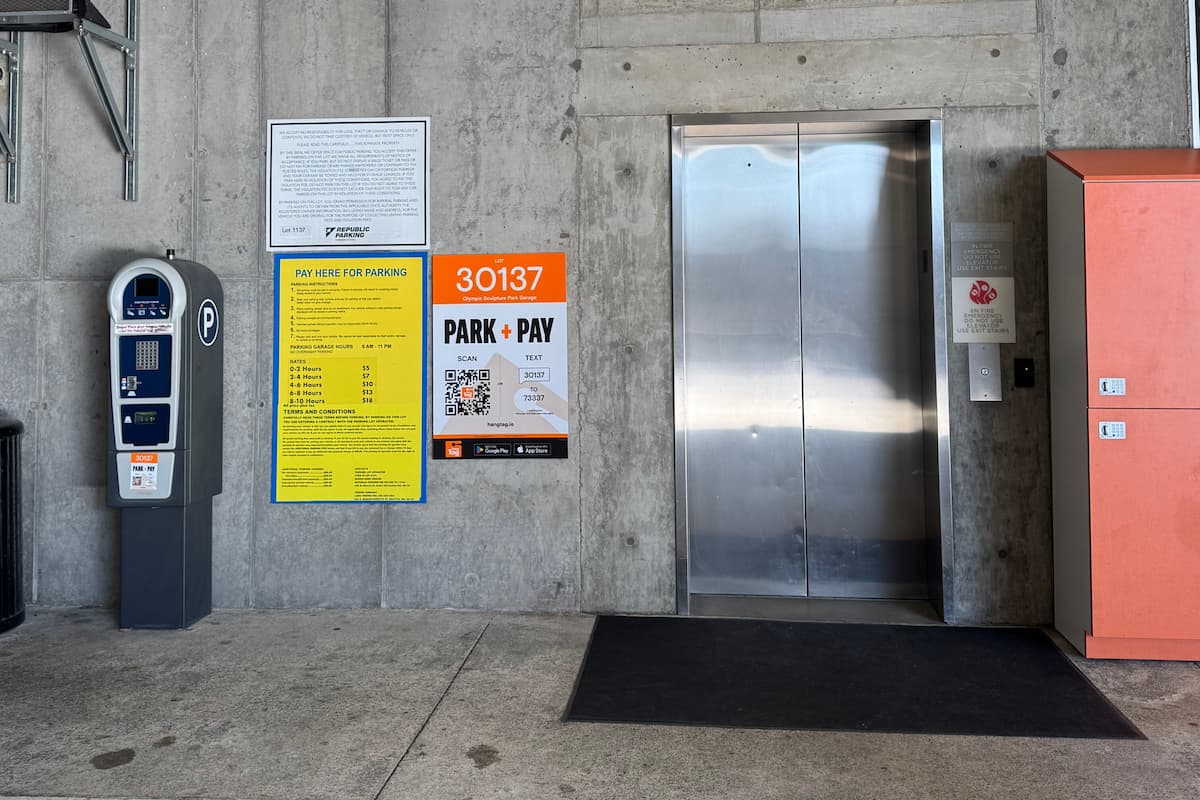
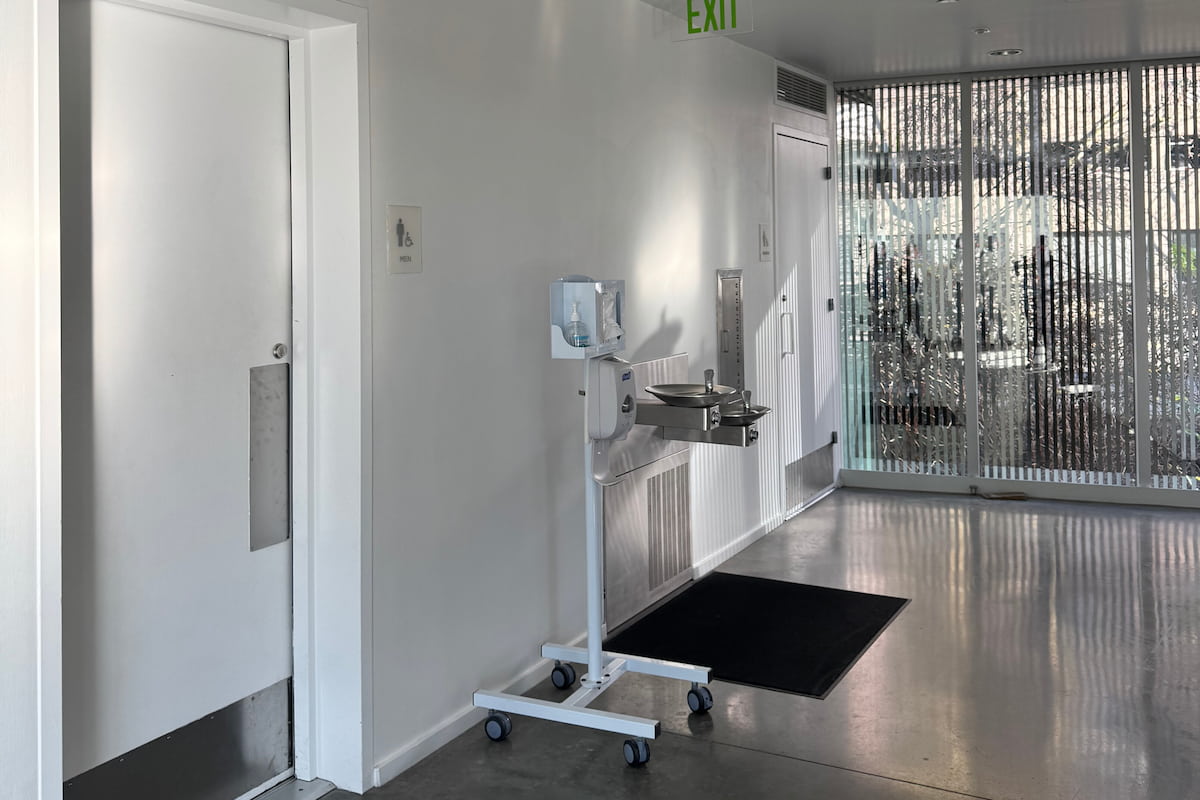
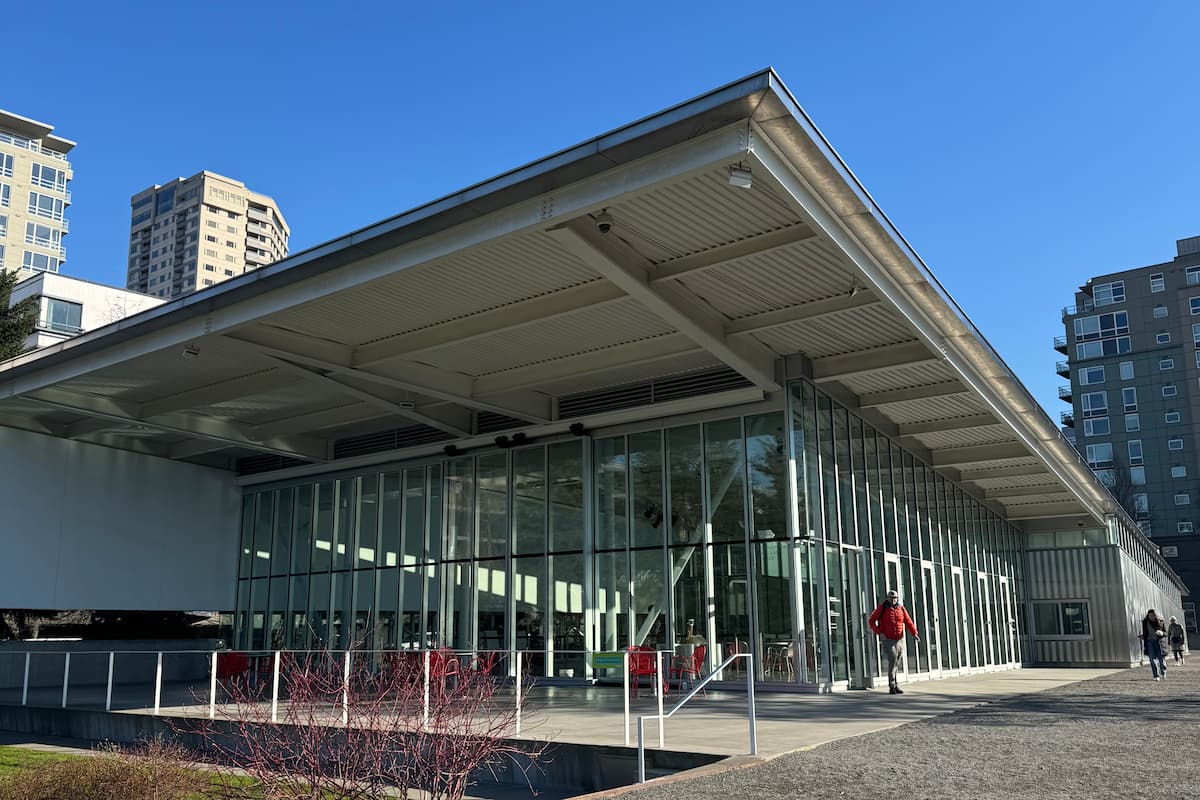
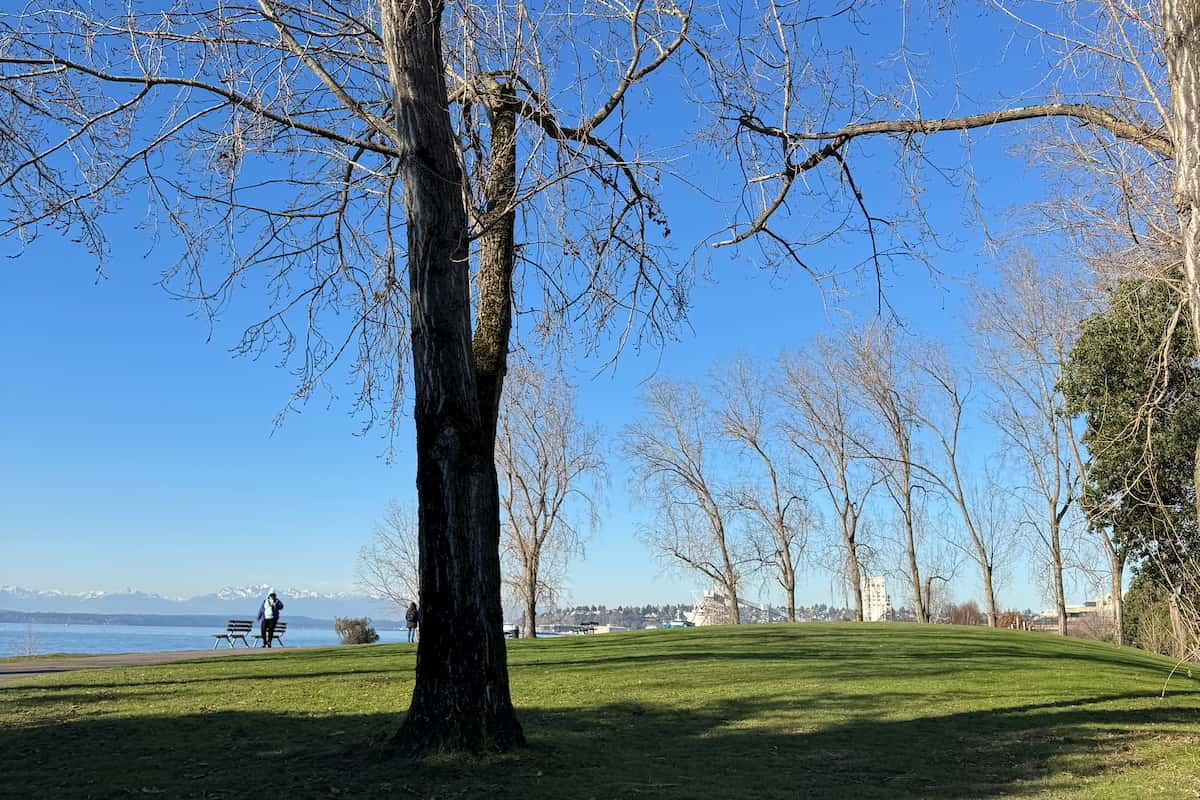
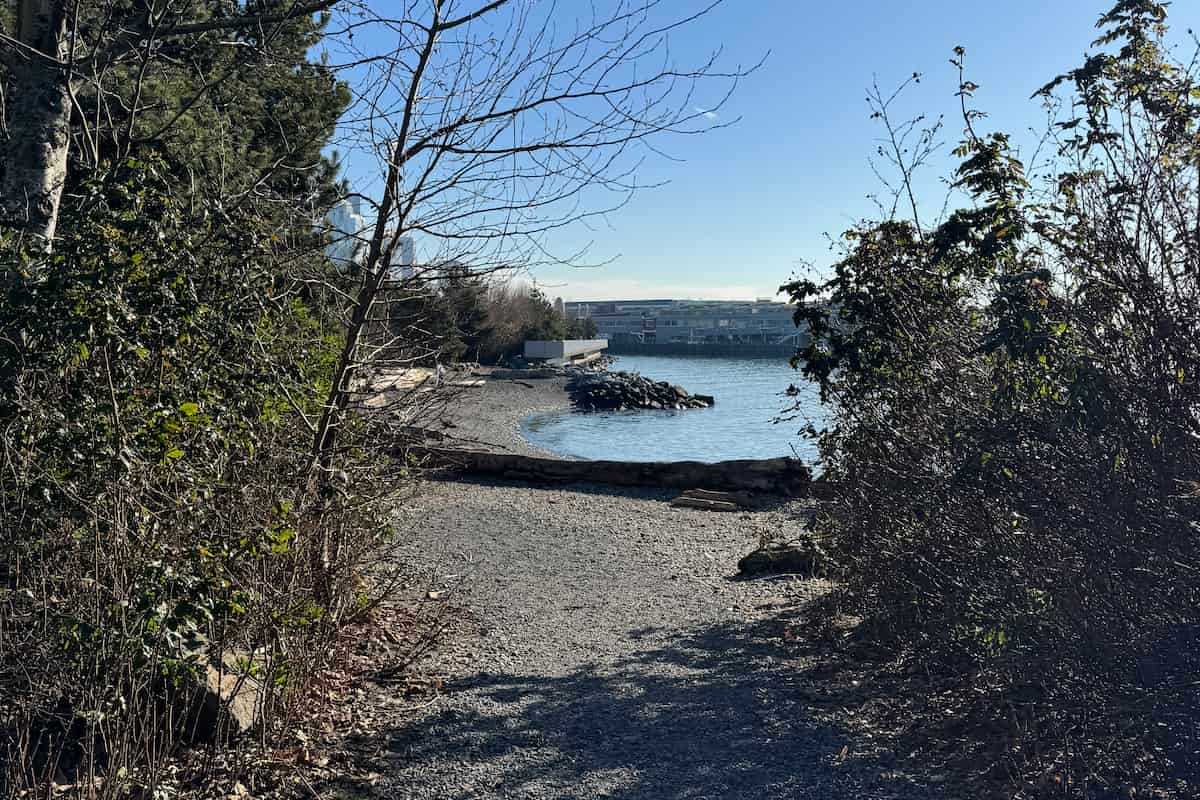
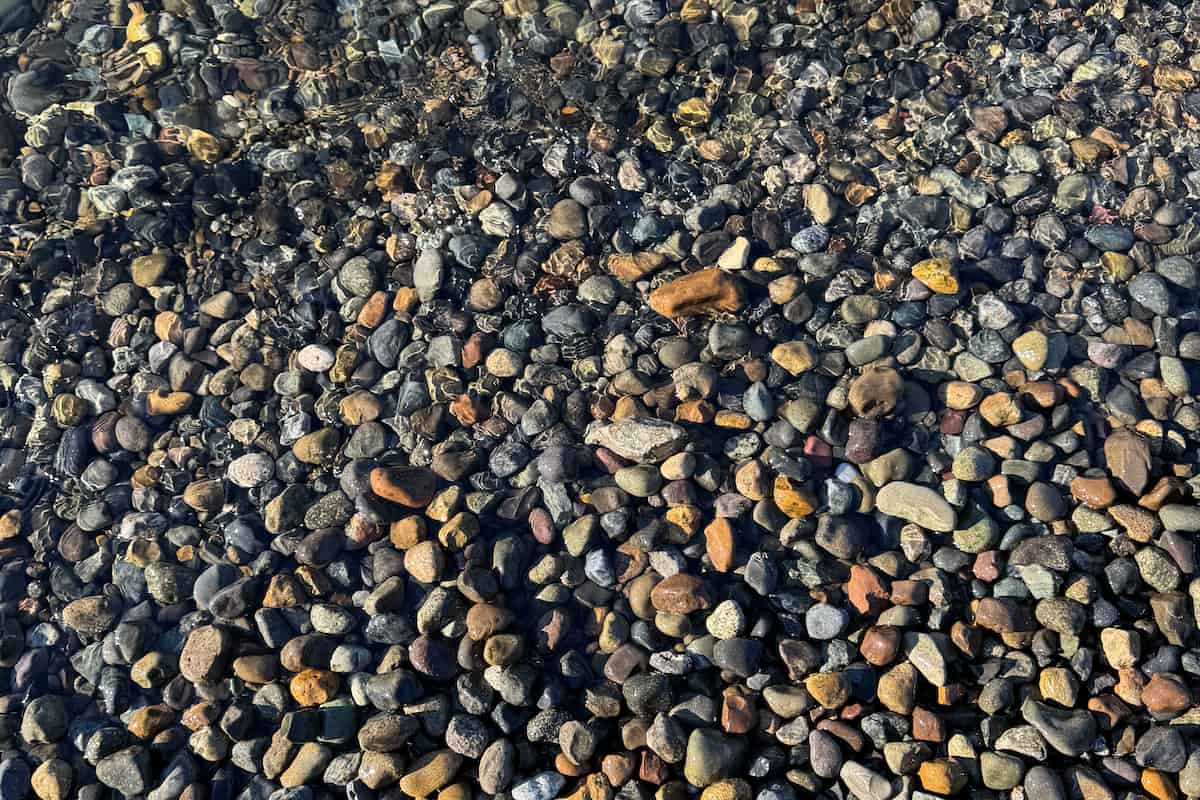
Redondo Beach Park
- Address
28231 Redondo Beach Drive S, Des Moines, WA 98198
- Land acknowledgement
Puyallup, Cayuse, Walla Walla, Umatilla
- About the beach
This beach is located in Des Moines, which is just south of Seattle. It is a popular site for scuba divers to take in the underwater world of Puget Sound. The MaST Center Aquarium run by Highline College is located on the pier above the beach. This is a great place to take younger age groups because they can explore the small aquarium (by appointment only during the week) and then spend time outdoors looking at animals in their natural environment. This beach is characterized by a cobble/gravel/sand mix. It can be slippery in certain patches when the algae grows over the rocks.
- Park hours
Every day 5am to dusk
- Parking
There is a municipal lot (paid) opposite the MaST Center and street parking on the side streets off Redondo Beach Drive S.
- Bathrooms
The public restrooms are located near the MaST Center on the waterfront boardwalk. There are gendered, ADA-compliant restrooms, but there is a small lip to be aware of when entering the building.
- Accessibility
There are no ramps that lead to the beach from the parking lot, only stairs. The stairs are steep with a height of about 6 inches per step. There is no seating on the beach itself but there are benches located on the waterfront and piers above the beach. There is shade by the seawall or under the piers depending on the time of day. There is a large grassy park across from the parking area that has benches but no permanent shelters to offer shade. Potable water is available at the public restrooms by the pier and at the MaST Center (open on Saturdays).
- Animals you might meet
Sea stars, moon snails, hermit crabs, dog whelks, periwinkle snails, shore crabs, sand dollars
- Best tide level
This beach is best for days with tides lower than -1 foot. There is plenty of beach to explore on days with low tides of 2 feet; however, you are unlikely to see much sea life. There are eelgrass beds that are deeper and can only be seen on days when the tide is farther out.
- NOAA buoy
- Website
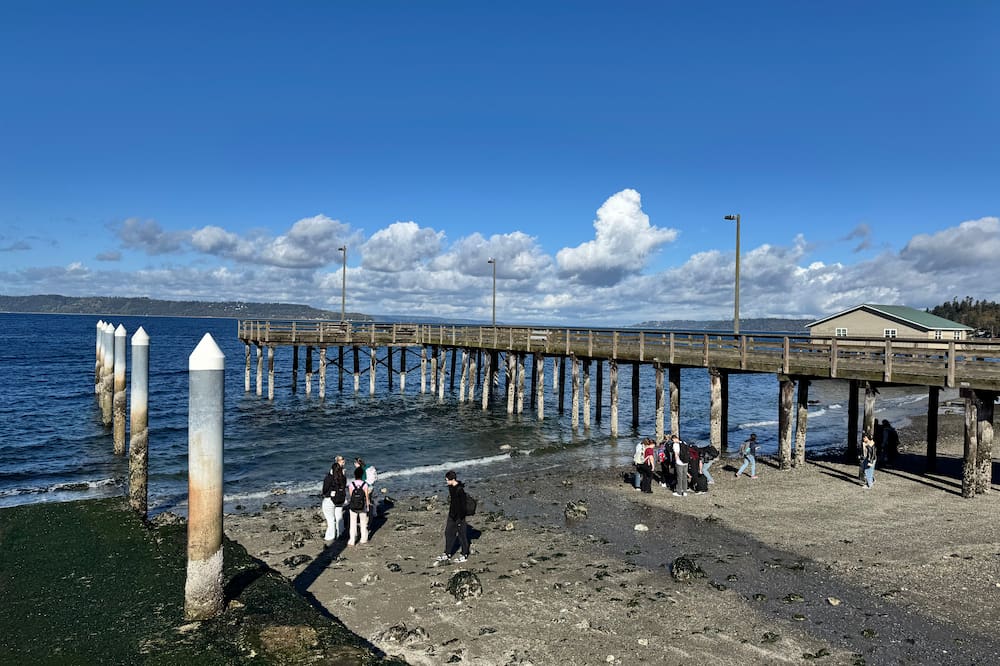



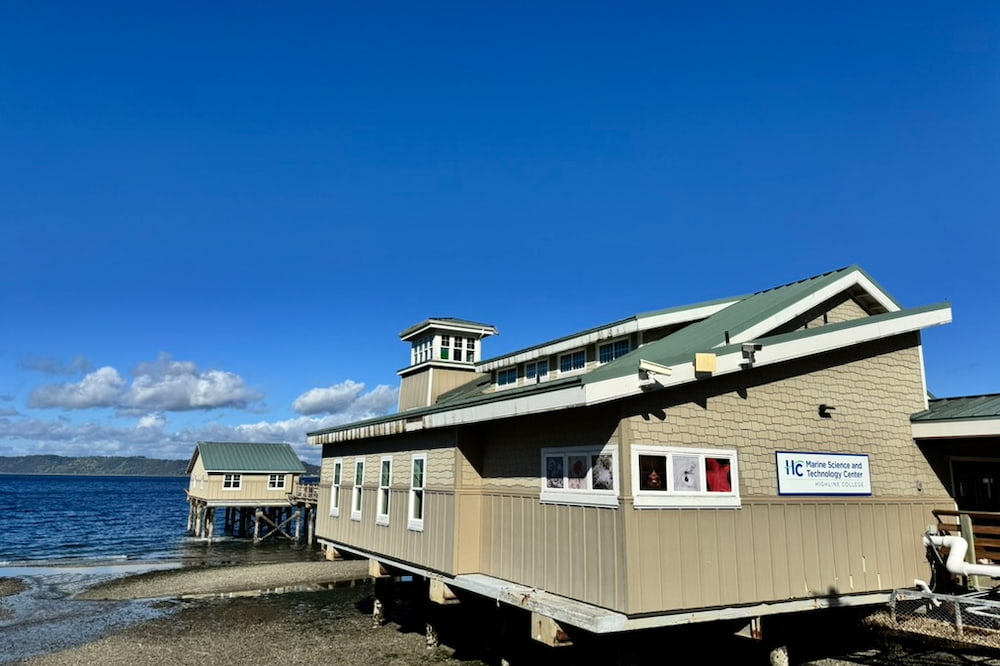
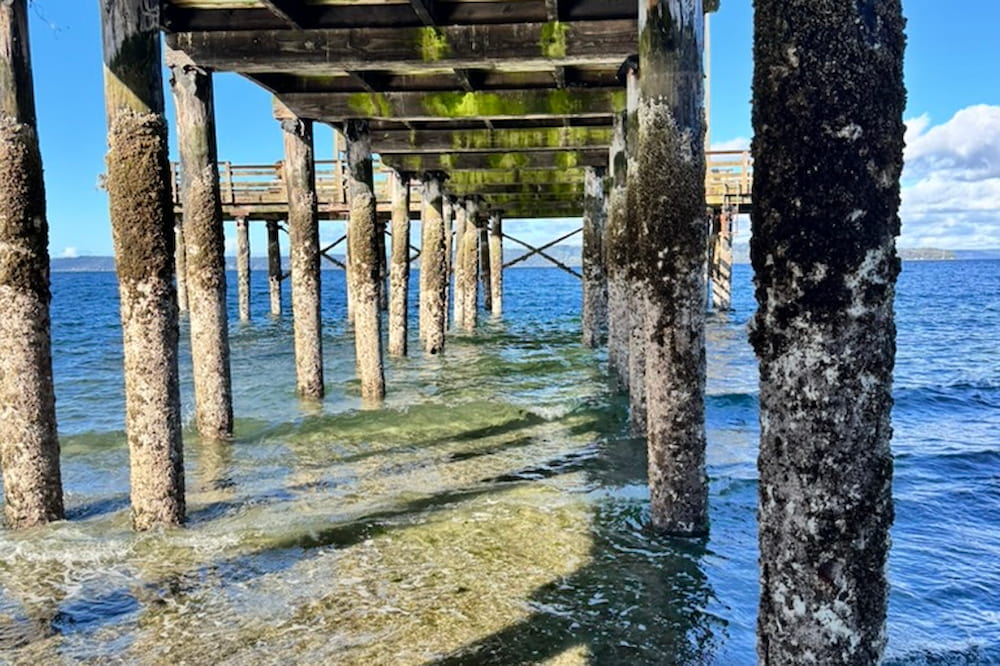
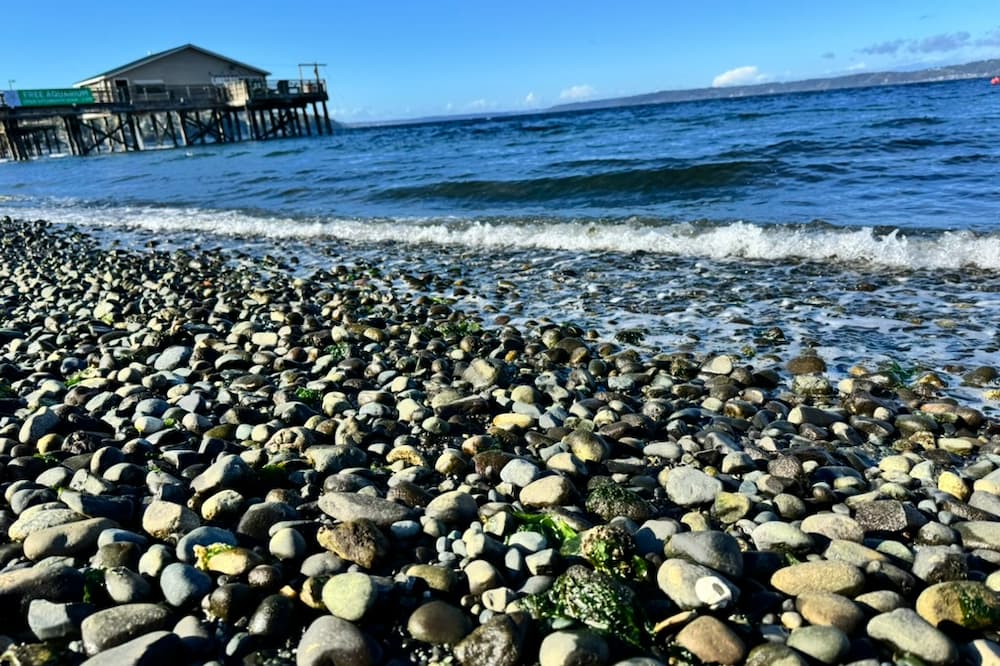

Richmond Beach Saltwater Park
- Address
2021 NW 190th St, Shoreline, WA 98177
- Land acknowledgement
Snohomish, Suquamish, Umatilla, Cayuse, Walla Walla
- About the beach
This park is located just north of Seattle in the Shoreline neighborhood. It has multiple parking lots, the largest being located closest to the beach. There is a large overpass that runs on top of railroad tracks that you have to cross to get down the beach. This beach is very sandy on the south end and rocky with large cobble on the north side. There is a nice picnic area near the bathrooms on the beach.
- Park hours
Every day 10am to 9pm
- Parking
There is plenty of parking here. The upper lots are smaller and have quite the hike down to the beach, so we recommend parking in the lowest lot. This does fill up quickly on nice days so be sure to visit in the morning. This lot has room for buses to park or just drop off. Parking is free. A bonus of this parking lot is that there is a large reservable structure for shelter as well as gendered, ADA-compliant bathrooms toward the back of the lot.
- Bathrooms
There are gendered, ADA-compliant bathrooms located in the parking lot closest to the beach and restrooms on the beach itself. The beach bathrooms are located by the reservable shelter at the bottom of the railroad overpass ramp.
- Accessibility
There are several places to find shelter at this park. There are reservable shelters near the parking lot and at the beach itself. There are tall trees that provide shade at certain parts of the day. There is potable drinking water at both of the public restrooms. The pathway down to the beach can be steep depending on which parking lot you are coming from. The paths are well maintained and flat, so someone with limited mobility would be able to use a wheelchair to access the beach. There is a long, steep pedestrian bridge that crosses a set of train tracks that might be difficult for someone with limited mobility to traverse. The bridge does tend to shake when trains run underneath it. The beach itself is relatively flat and characterized by both sandy and cobble substrates. There are two access points wide enough to where a wheelchair can get through the logs that create a barrier between the beach and the vegetation line.
- Animals you might meet
Aggregating anemones, sand dollars, shore crabs, hermit crabs, barnacles, red rock crabs, sea lions, harbor seals, harbor porpoises, grey whales, orcas
- Best tide level
This beach is best to visit at tides that are 1 foot or lower for tide pooling. This beach is great for watching megafaunas like sea lions, harbor seals, harbor porpoises and orcas.
- NOAA buoy
- Website

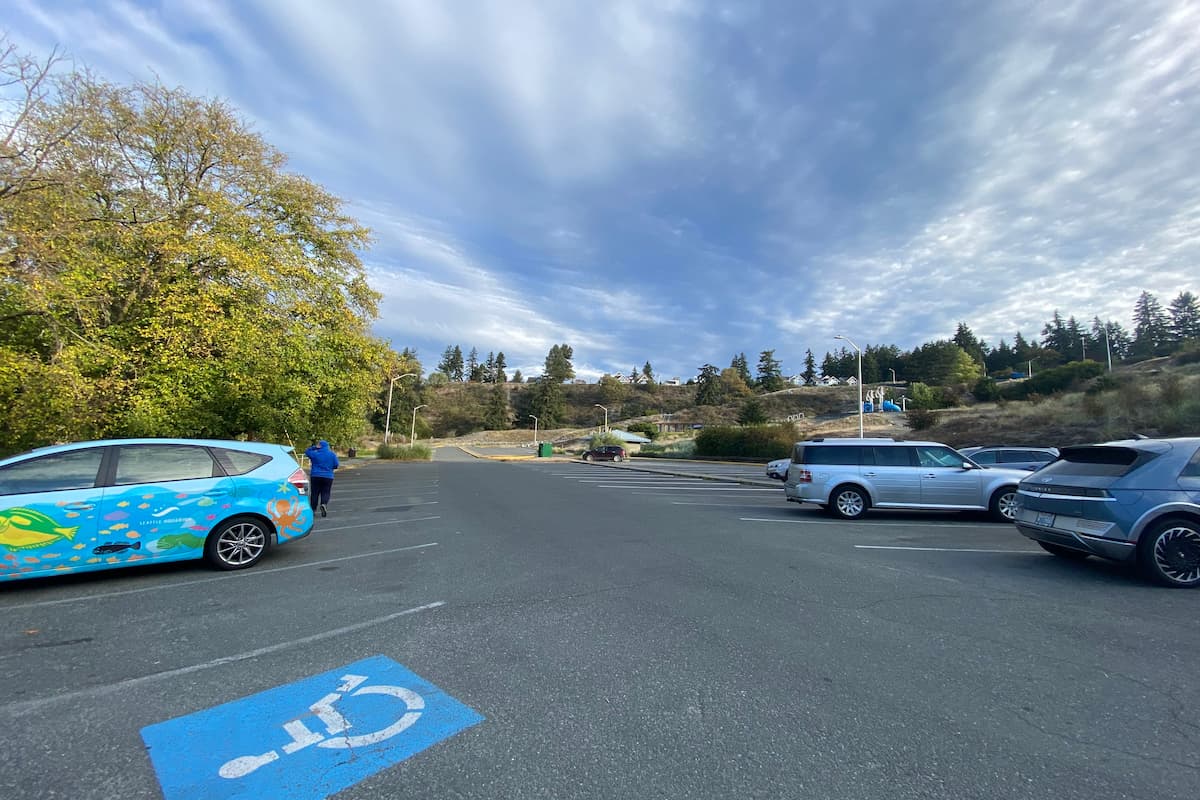



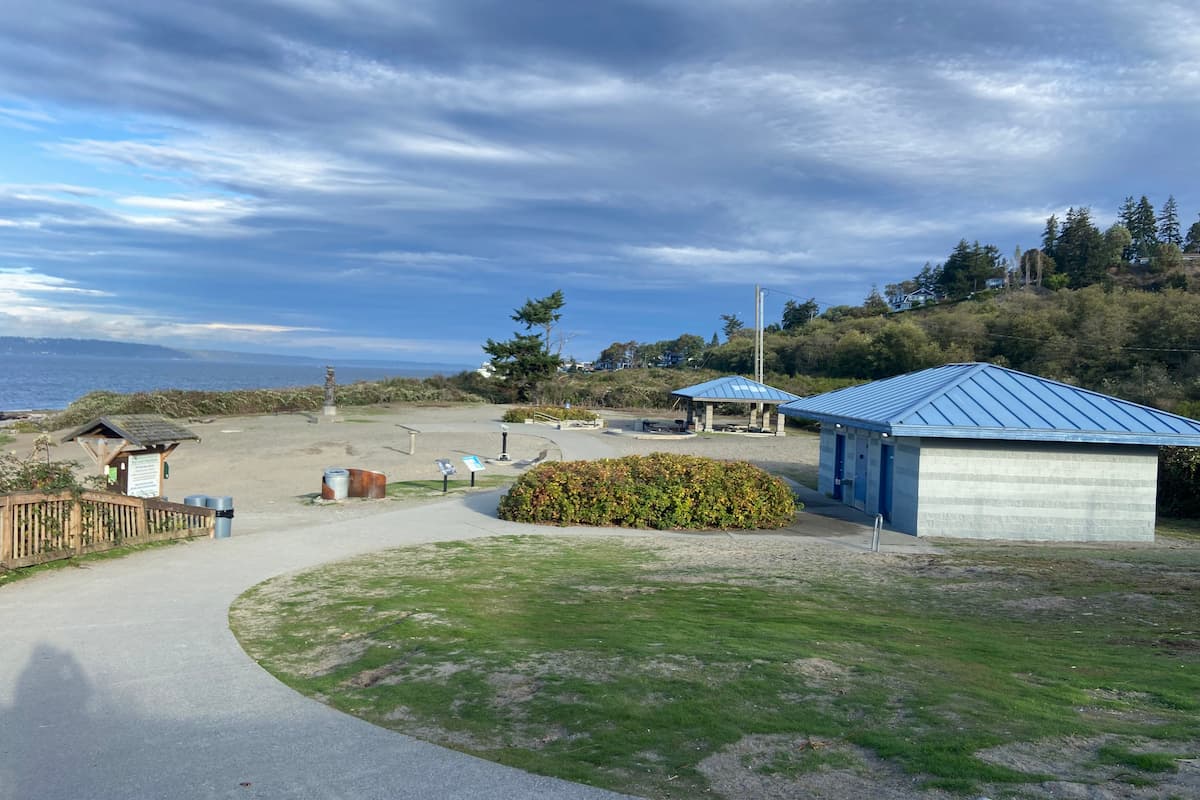
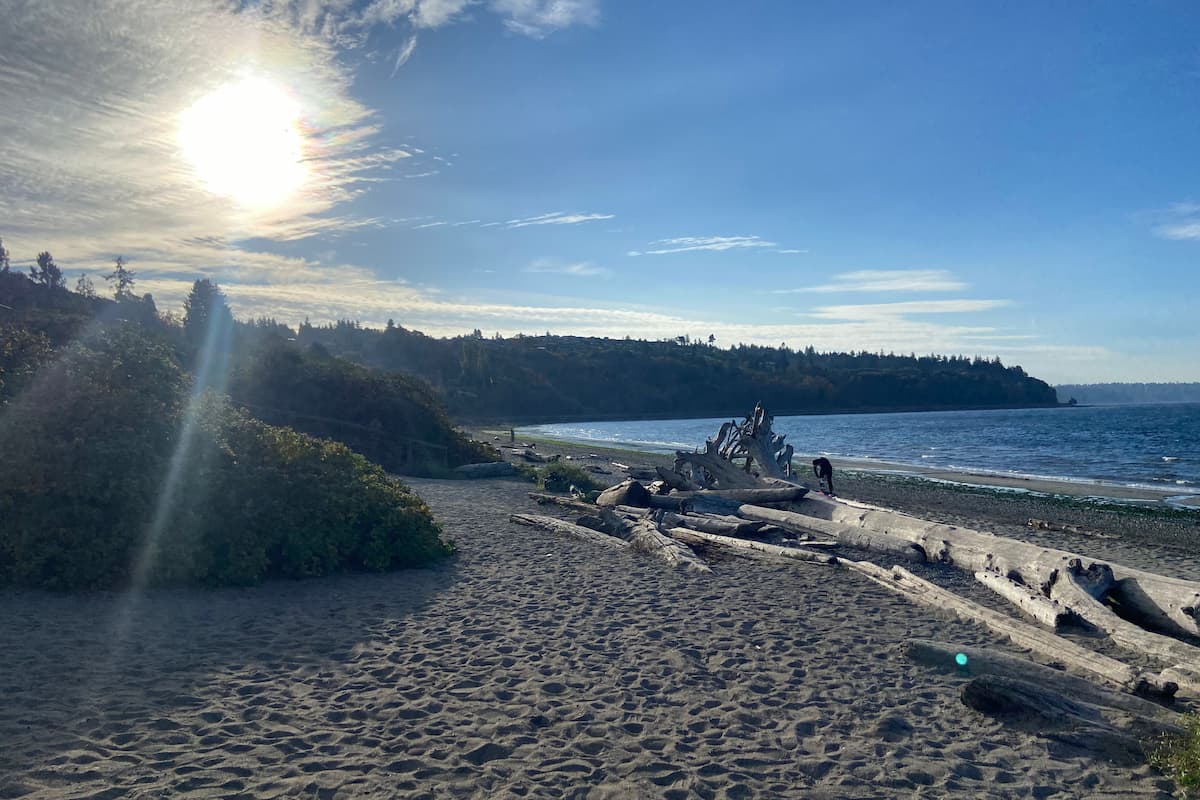
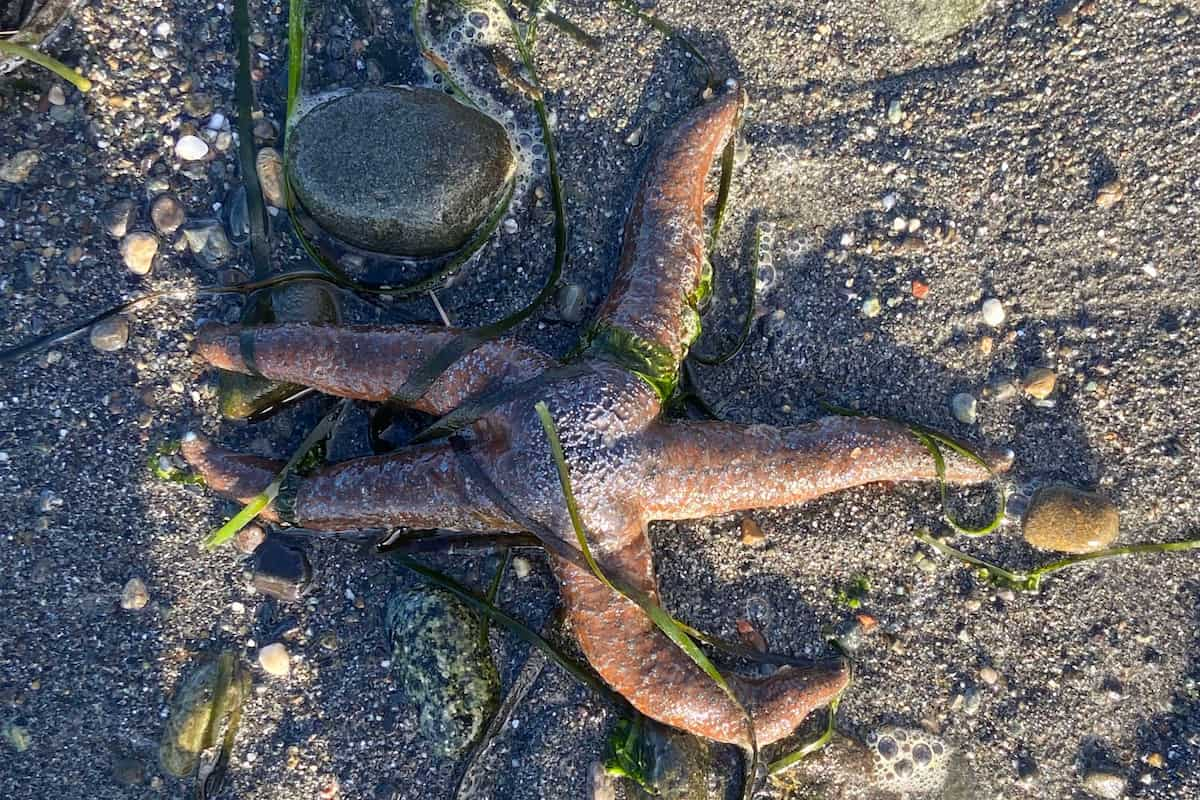
Rockaway Beach Park
- Address
4002 Rockaway Beach Road NE, Bainbridge Island, WA 98110
- Land acknowledgement
Suquamish territories
- About the beach
This beach stretches along a group of waterfront homes that face downtown Seattle. This is a great place to come and explore tide pools because there are many rocky outcroppings on the right side of the beach that provide a home to abundant sea life. There is limited parking and no bathrooms at this location, but downtown Bainbridge is only a 10-minute drive away in case of any bathroom emergencies.
- Park hours
M–F: 5am to 8:30pm
Sat: 7:30am to 4pm
Sun: 8am to 4pm
- Parking
This beach has no parking lot. There are a few spots for cars to pull off on the side of the road near the stairs that take you down to the beach. There is not enough room for buses to easily park at this beach so we recommend having your students dropped off and picked up.
- Bathrooms
There are no public restrooms at this beach. Our recommendation would be to stop in downtown Bainbridge before heading to that side of the island.
- Accessibility
This beach has a narrow set of stairs that lead down to the water and no alternative pathways. The beach is characterized by larger rocks and pebbles so it can be difficult to walk on at times. There is an overlook of the beach and Seattle skyline that has several benches to sit on which is easily accessible from the road via a dirt path. There is no potable water source at this site. Shade can be found in the grassy area before you descend the stairs to the beach.
- Animals you might meet
Ochre sea stars, burrowing sea cucumbers, oysters, mussels, sea snails, hermit crabs, clingfish, gunnels
- Best tide level
We recommend coming to this beach on any days that the tide level is 0 feet or lower. More beach is exposed when the tide level is in the negative which makes it easier to view the animals that would otherwise be underwater. It is especially important to read the tide chart before coming to this location because the water level rises to the very top of the beach.
- NOAA buoy
- Website
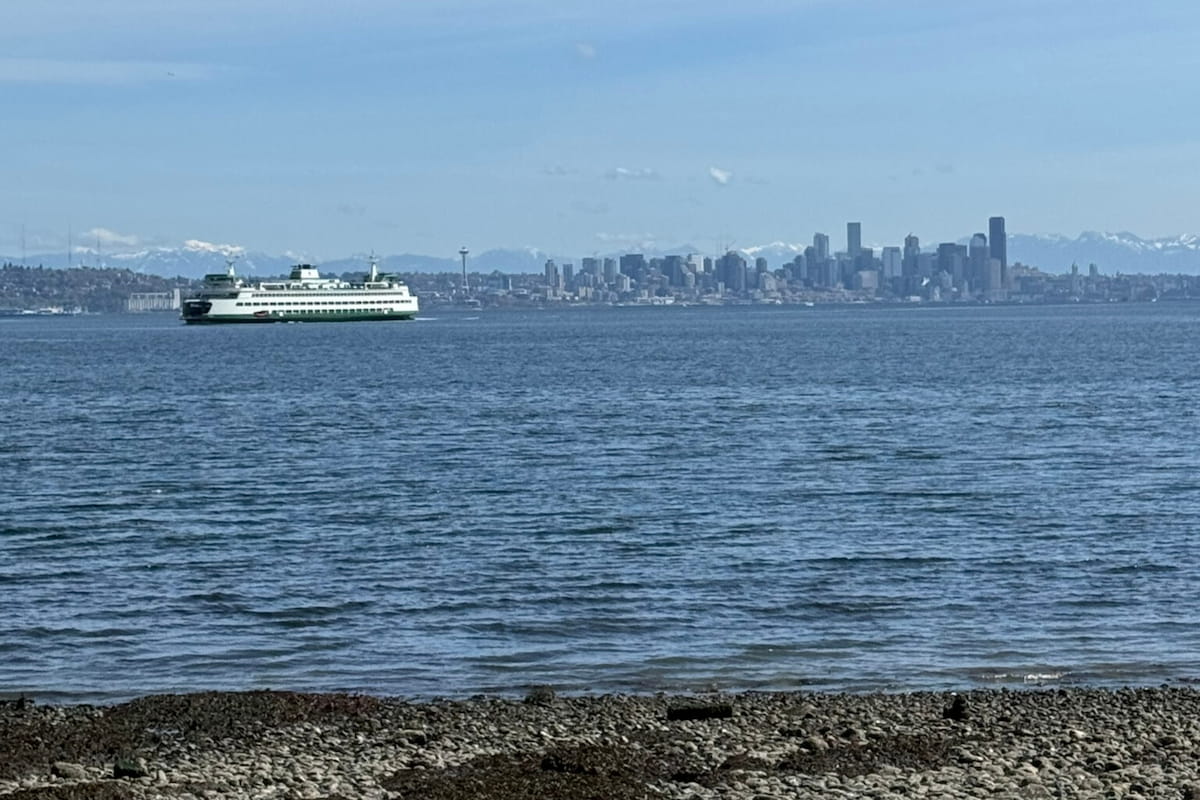

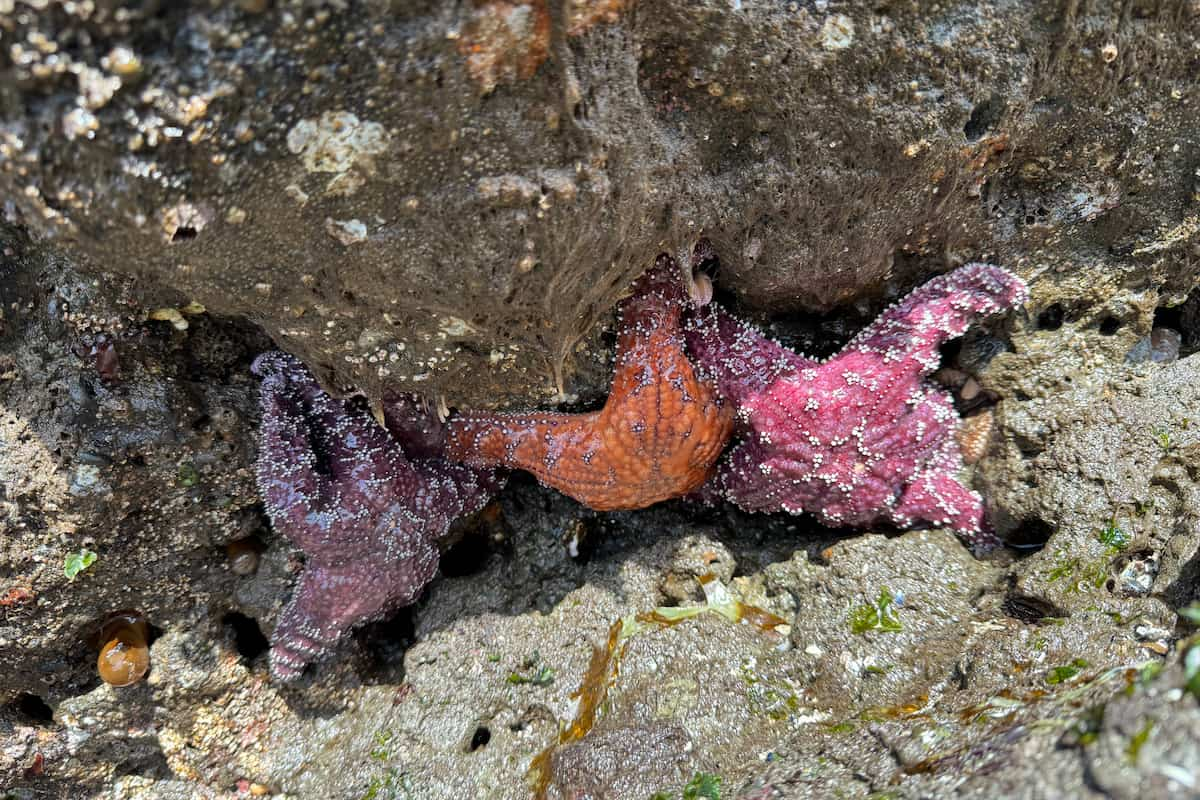
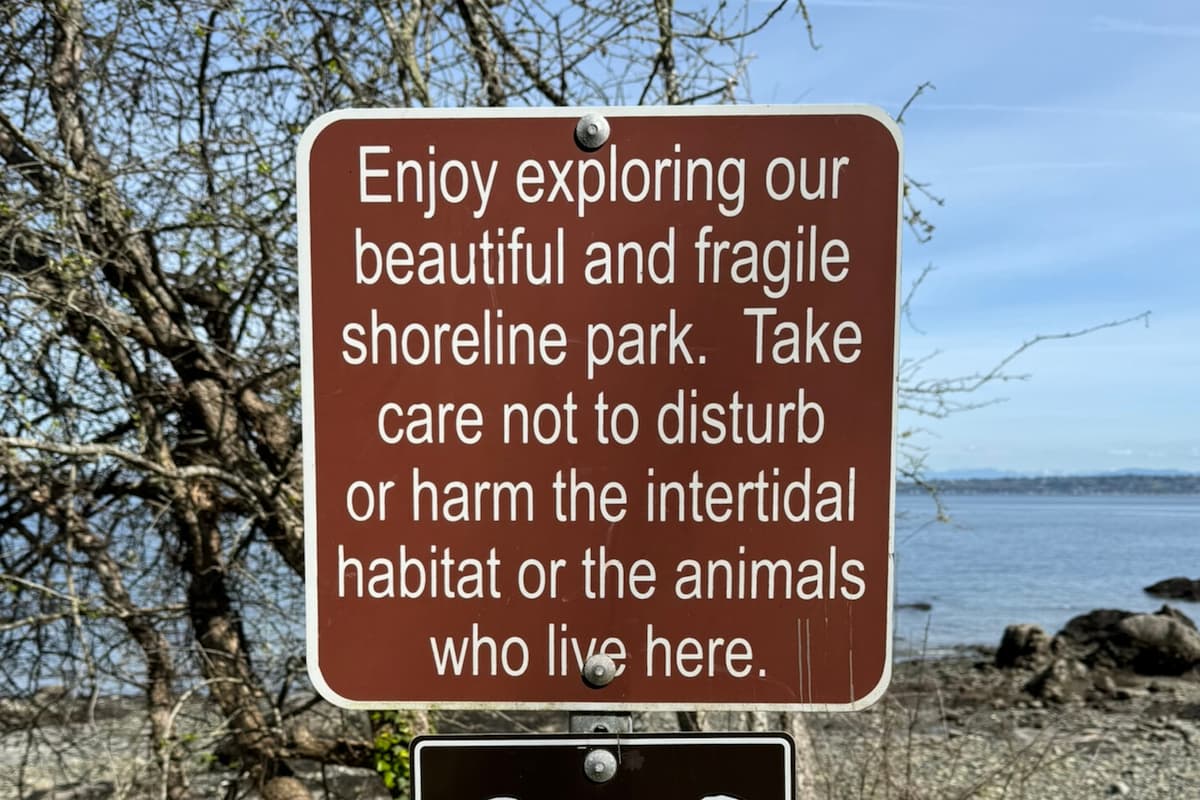

Saltwater State Park
- Address
25205 8th Place S, Des Moines, WA 98198
- Land acknowledgement
Muckleshoot, Puyallup, Umatilla, Walla Walla, Cayuse
- About the beach
This is a beautiful park tucked away in Des Moines, WA, that is popular with scuba divers. There is a large parking lot that provides lots of space for buses to pull in and park, however you must have a Washington State Discover Pass. There is a small stream that flows into the Puget Sound here that you might have to cross to access the other side of the beach. There is a large gravel path along the beach for those who do not want to get wet, as well as bathrooms and a playground. This beach is very flat, and the substrate consists mostly of sand and cobble making for an easy walking experience.
- Park hours
Every day 8am to dusk
- Parking
There are plenty of parking spaces at this park. Buses can easily pull in, drop off and park for the day. A Washington State Parks Discover Pass is required for entry to the park. You can purchase a day-use or a yearlong pass online. A day-use pass costs $11.50 and a year pass is $35. This grants you access to over 100 state parks. Note that some public school buses have exempt license plates meaning that they can enter the park without a Discover Pass, but make sure to double check with your district’s bus company before arriving.
- Bathrooms
There are gendered, ADA-compliant bathrooms in the parking lot.
- Accessibility
This beach has a flat, paved path that runs parallel to the beach. There are a few trees that provide shade near the parking lot, but there is no area on the beach itself that allows someone to take a break from the sun. There is a reservable picnic shelter as well as uncovered picnic tables scattered throughout the beach area for sitting. The only potable water source is the sinks in the public restrooms so it would not be good for filling up water bottles. There may be running water at the campgrounds, but you must reserve those to use the amenities.
- Animals you might meet
Sea snails, small and large crabs, hermit crabs, chitons, mussels, limpets, geoducks, gunnels, clingfish, nudibranchs, moon snails, giant blue heron, harbor seals, sea lions
- Best tide level
This beach is best visited on tides that are less than 2 feet.
- NOAA buoy
- Website
Seahurst Park
- Address
1600 SW Seahurst Park Road, Burien, WA 98166
- Land acknowledgement
Muckleshoot, Duwamish, Suquamish, Umatilla, Walla Walla, Cayuse
- About the beach
This park is located in Burien, which is just south of Seattle. It has a saltwater beach, reservable picnic shelters and a path that runs parallel to the shoreline. There is a playground area that has expansive views of Puget Sound and the Olympic Mountains. The beach itself is characterized by wet sand, slick cobble patches, and eelgrass beds, so make sure to have your students watch their step! The beach is relatively flat and very long, so your group has plenty of room to roam and explore.
- Park hours
Every day 8am to dusk
- Parking
Parking spots at the beach area are limited, but there is a large lot in the upper area of the park. Note that the upper parking lot is about a 10-minute walk downhill to the beach. There is a roundabout for buses to drop off students right at the beachfront. Parking at this site is free of charge.
- Bathrooms
Restrooms are located along the path to the right of the beach parking lot. These are gendered bathrooms, and each has a wheelchair-accessible stall.
- Accessibility
There is limited access to shade when on the beach itself. There are a few reservable shelters along the path that runs parallel to the beach where you can find shade. Trees along the shoreline trail and parking lots provide shade from the sun while walking. There are two drinking water fountains by the restrooms where you can find potable water, however it isn’t the easiest for filling water bottles. All paths here are well maintained and mostly wheelchair user friendly. The shoreline trail is made of hard packed gravel and paved in some spots. There are logs that line the top of the beach that you will have to find a path through or over. Transitions from concrete pathway to beach substrate have a height no more than one inch which can be traversed in a wheelchair.
- Animals you might meet
Shore crabs, anemones, hermit crabs, gunnels, mussels, limpets, barnacles, sea snails
- Best tide level
This beach is especially great for super low tide days. Ideally, you would be visiting this beach when the tide is at a minimum of –2 feet. Fun can still be had at the beach even if the tide isn’t super low by looking out for megafaunas such as sea lions, harbor seals and harbor porpoises swimming by. Don’t forget to bring binoculars!
- NOAA buoy
- Website
